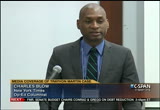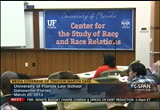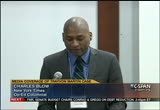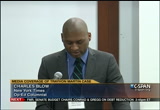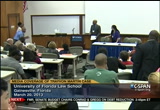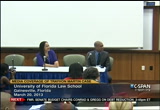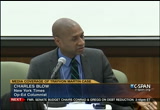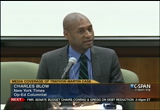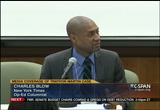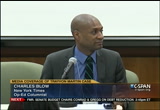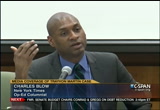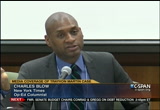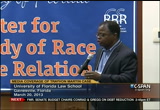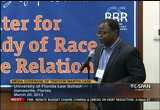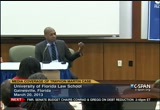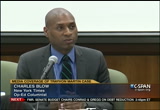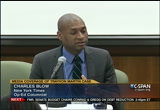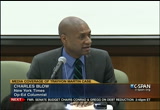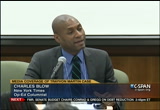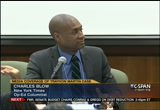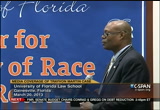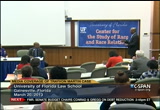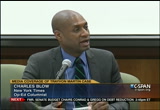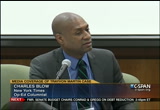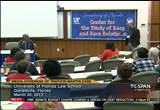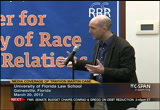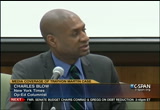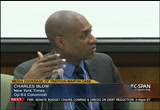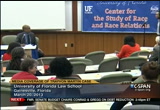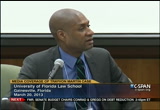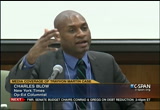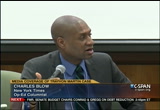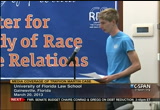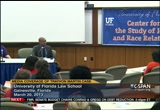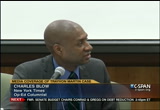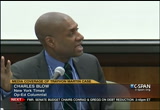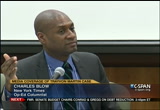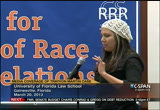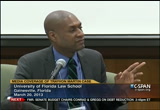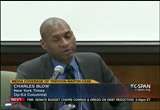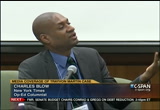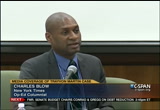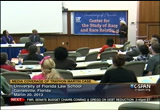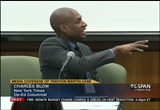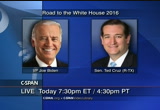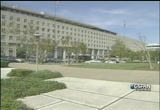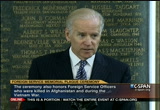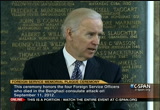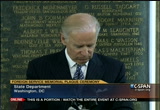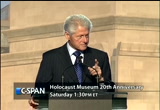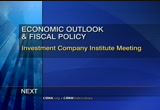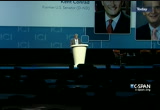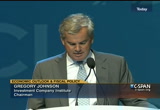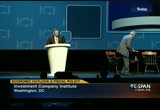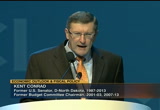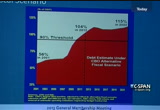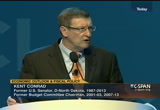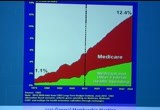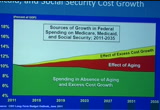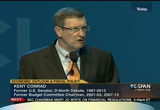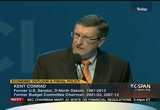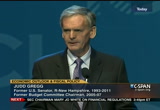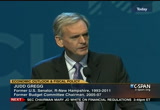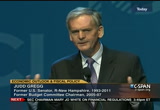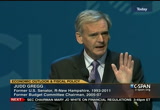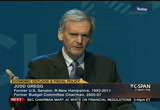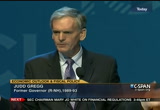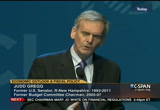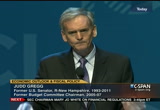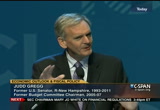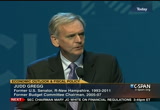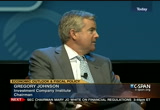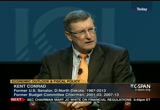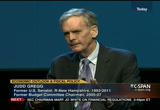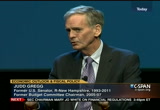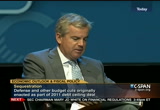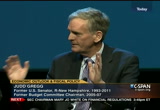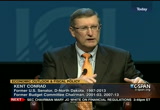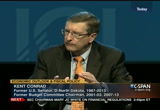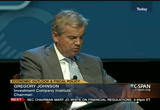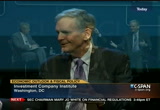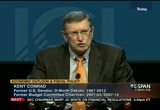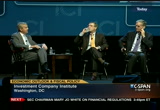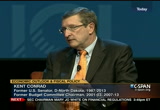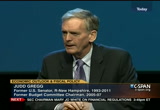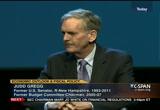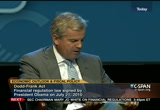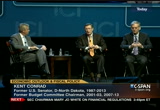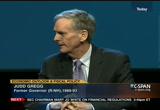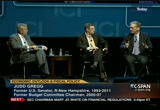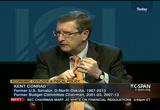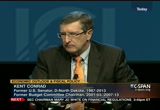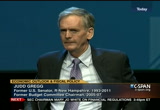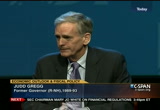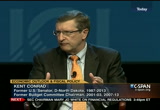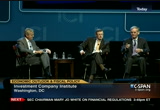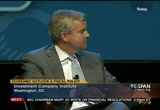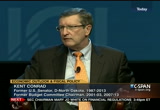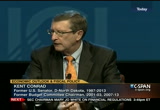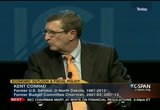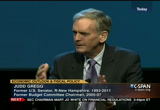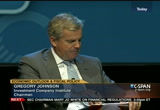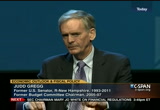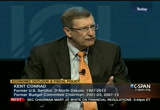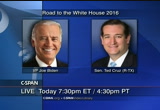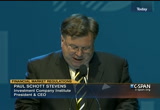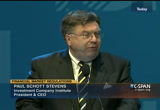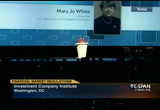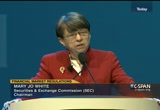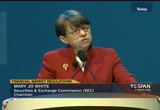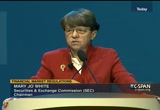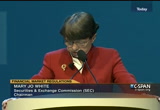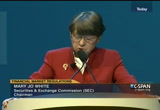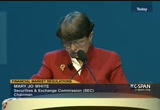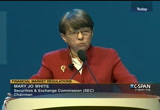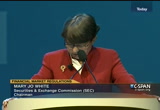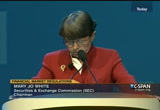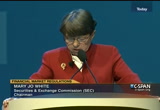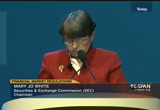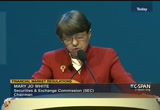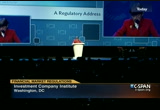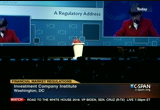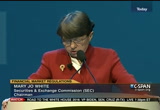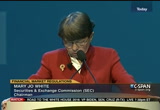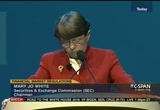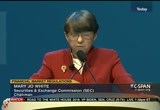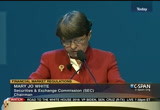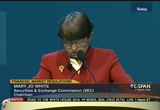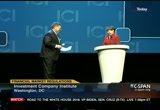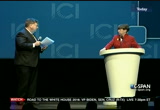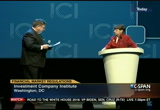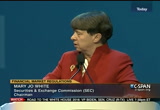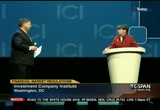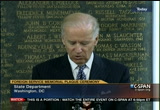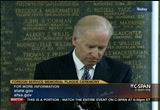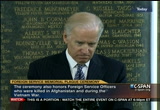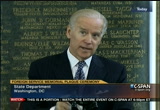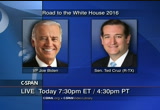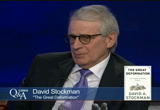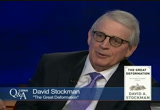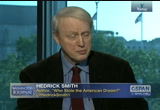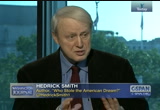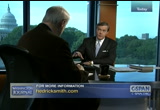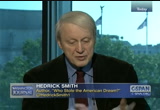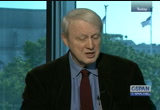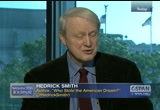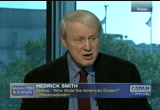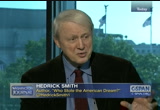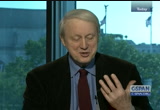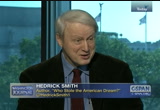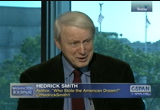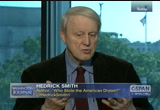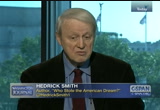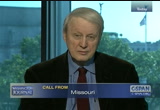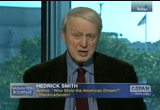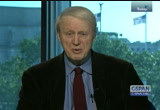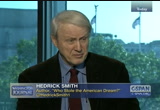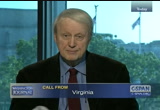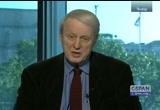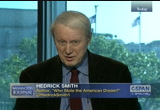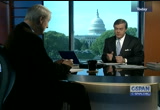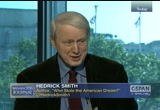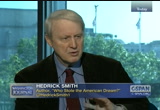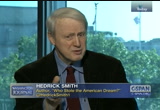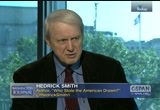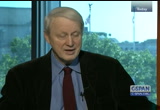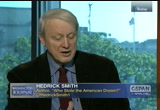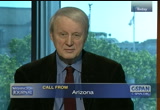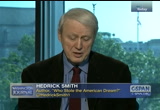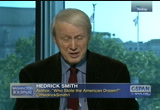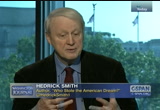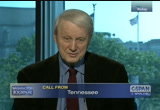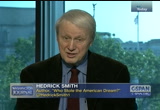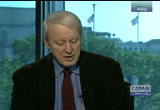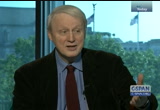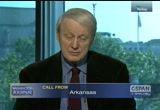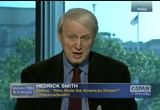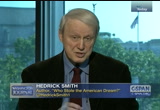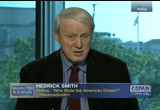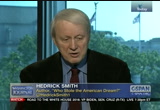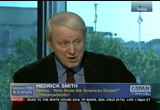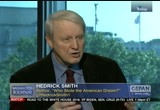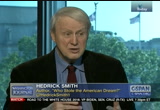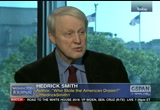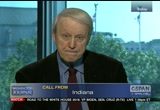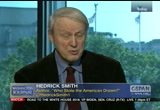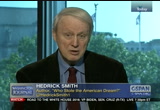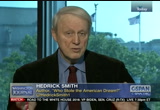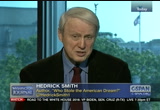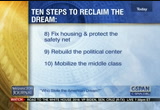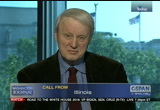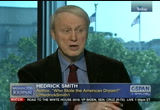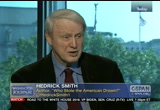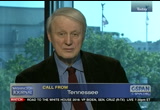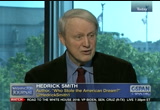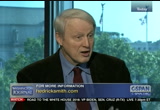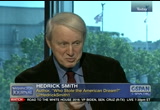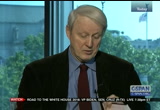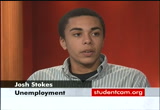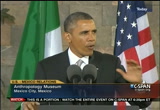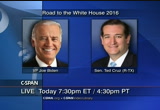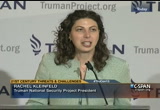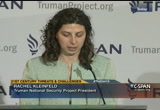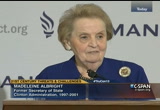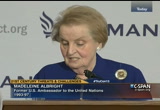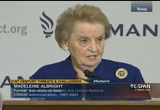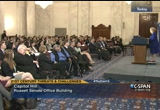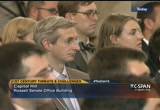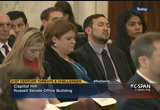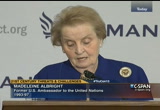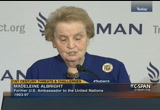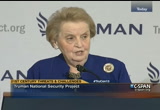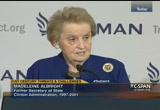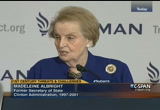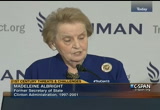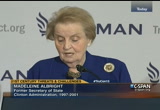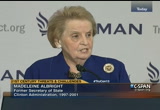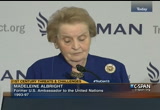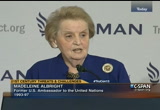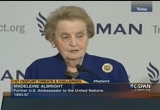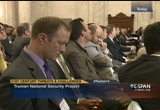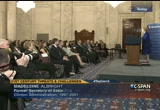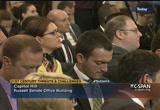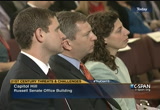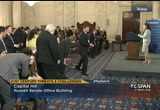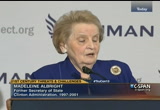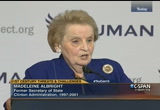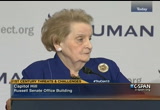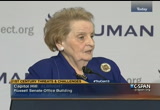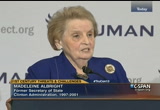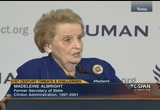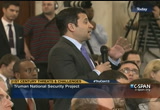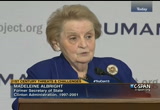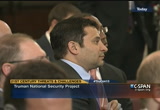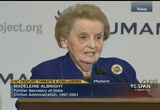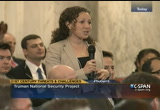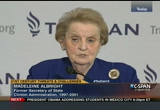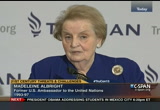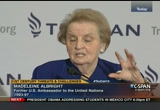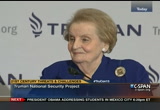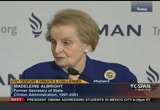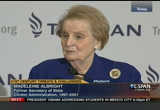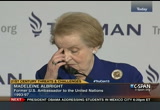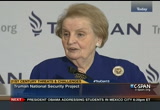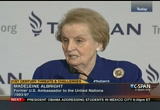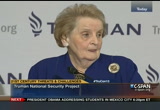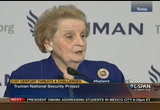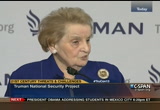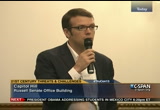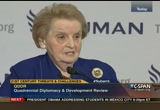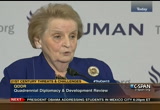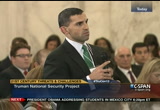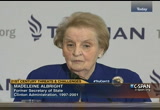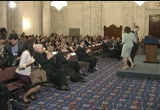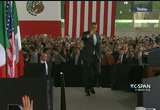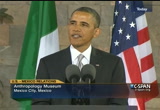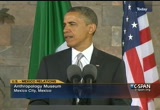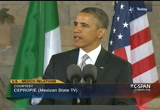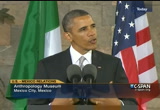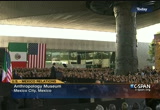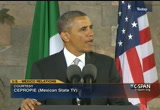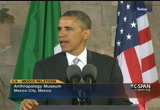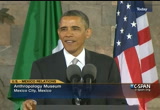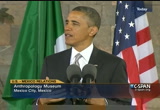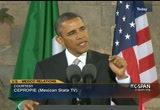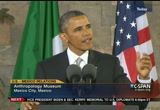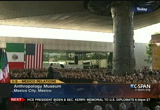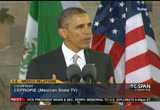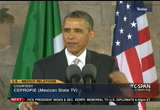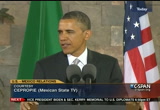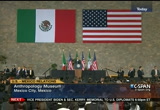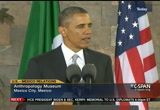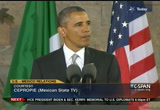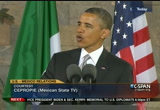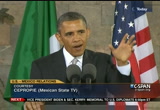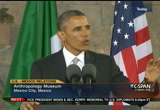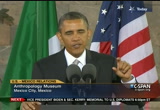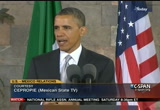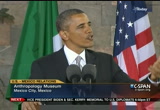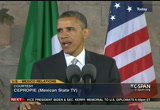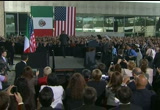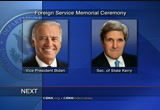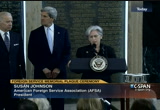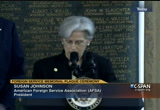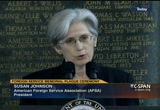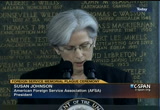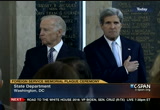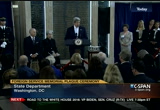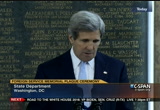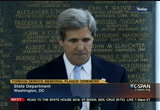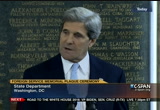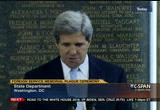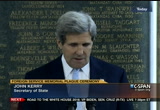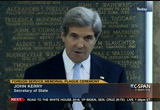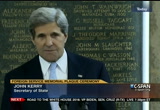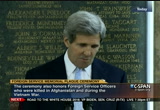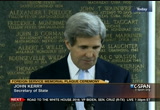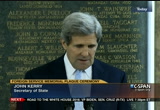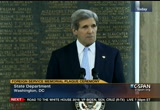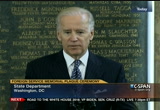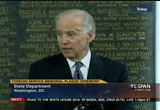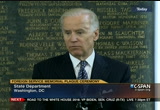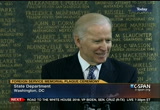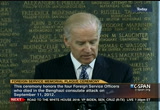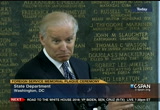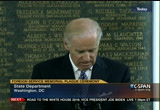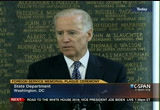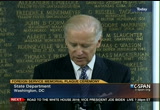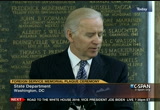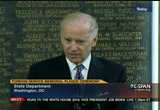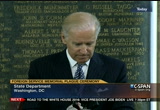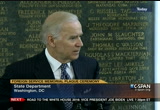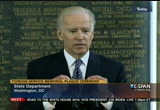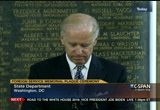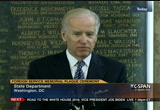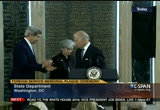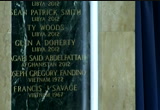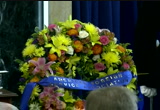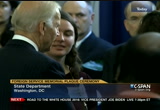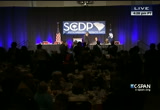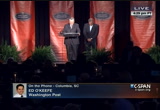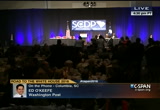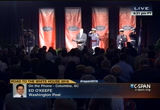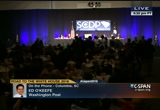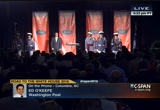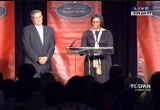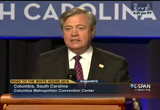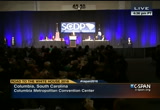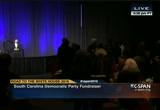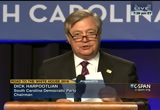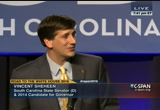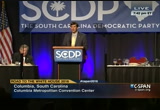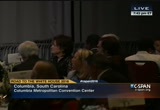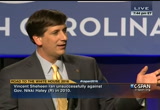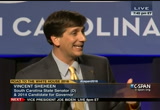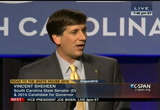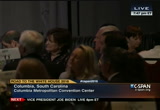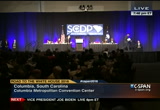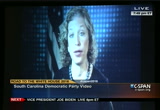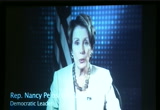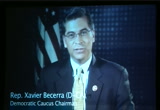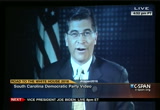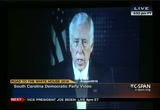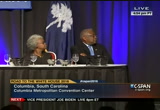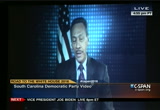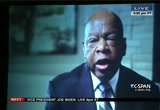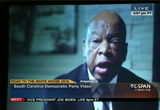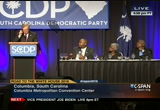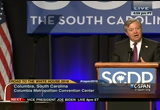tv Politics Public Policy Today CSPAN May 3, 2013 2:00pm-8:01pm EDT
2:00 pm
coveragenbc's is now opinion driven material. the only place that has about the same balance of opinion and straight news is cnn > that is a real shift of how we are getting our news. the appetite for neutrality is changing. we want to live in a cocoon where we just hear our own thoughts reinforced over and over again. we have to ask what that says about us as a nation and how this reflects on this particular case where people tune into particular places so they can confirm whether or not they believe that zimmerman was innocent or guilty.
2:01 pm
i love what i do but my opining depends heavily on other people's report. there's often an original reporting interwoven. there is almost always reference to what others have reported. heavily toond opinion journalism, often disproportionately. i often joke that i could write thatmon -- write a column would be at top of this e-mail list. somebody can work three months on an investigative piece about what iran is doing to acquire nuclear weapons and it will not make a difference. i find that to be a bigger problem. i call that the rise of personnel in journalism. the marquee names are the
2:02 pm
colonists, the opinion writers. do what i do -- reporters who do what i do -- war coverage, that is more important to me. they will never did this in cad coverage or the same response i'm getting because it is not personnel -- they will not get the same kind of coverage for the same response i'm getting because it is not personnel. we're reaching a dangerous point in america where people want more ammunition than information. people prefer to be affirmed in their beliefs then challenged on their beliefs. what wee that that is have seen in the trayvon martin case. what they want to toieve and only listen sources that can confirm it.
2:03 pm
to wrap this up -- whatever eventually comes of this case will serve as an illustration that opinionated, partisan journalism is a growing force for better or for worse and america is responding to it. this case will always and forever more be seen through that prism. thank you very much. [applause] >> we have time for questions. if you have a question please come on down to the microphone.
2:04 pm
we encourage students, faculty, staff, community members. >> my name is jim. you gave me great comfort ,ecause if i'm ever kidnapped being incredibly good-looking there is hope. [laughter] i practice criminal law at stanford for 30 years. he does give the finest presentation of any case i have ever heard and you are probably the finest young journalist today. thank you for showing up today. [applause] >> thank you again for your wonderful talk today. my name is lisa, i am a professor of criminology. my question is more what you propose as a solution to this
2:05 pm
fine line between opinion-based vs fact-based drama was in? five or six are different papers, who knows what opinion you are getting? solution in mind, that people know what they're getting? i think -- i don't think the question is about people knowing what they are getting when they turn to a particular name. to krugman you turn know what they are going to say because they develop that voice of the time. thanis less an issue people's appetites' for actual news they have to do the heavy
2:06 pm
lifting. bird like the mother eliverg the food and d it to the mouth. that is the problem. the decrease in literacy, even among the most literate people you seeountriy, and last ask a kid with the book they read. it is shocking that it cannot read because it is fun. the only read because it is a hallmark. idea that wethat are getting to a point where they think getting news is reading a bunch of tweets, which read itally a headline
2:07 pm
or see things that flow through a facebook page or down a blog, that is not news and it does not make a well rounded citizen. i think as much as we might want to blame the media companies for that they are just trying to survive. they are giving whatever people will respond to. people were dying to get straight news and straight news coverage is getting a tremendous ratings you would see what people -- you would see people to it. the readings suggest a more partisan you become, the bigger the personality, the bigger the ratings. a media environment for advertisement is a traveling two media companies -- advertisement
2:08 pm
is shriveling those media companies are asking how they get the what and builds towards what we believe is vital interest. i think everybody is walking that line. the magazines could do a little bit better job because they have segregated areas. you have to buy the entire newspaper. online you do not. a tricky balance. on television there are three people at a time. we have to s.a., "how do hold that 30 minutes?" they are making choices that you need to hold personalities. i do not mean to say that to the republic but it is scary. [laughter]
2:09 pm
i am a retired faculty. opinion basedwith tunnel wasn't it is based on fact? if you present your fax and then you give an opinion and leave the door open for another interpretation, what is so wrong with that? >> as far as i'm concerned there is nothing wrong with that. [laughter] -- you take any incident, the new town incident youhe newtown incident, have the same set of facts but you can have a lot of different opinions about what that means, what it says about society and safety and how we should proceed in terms of making sure our children are safe. people can come at that from very different perspectives.
2:10 pm
the problem is when people are unwilling to be entertained -- unwilling to entertain perspectives that this different from theirs. if you read something that challenges what you believe that it does become an echo chamber. you are getting further and further and further away from being an independent thinker and letting other people to that thinking for you because that area is where you feel most comfortable. as an educated person, constantly be comfortable -- you should, as an educated person, constantly be comfortable. there is a certain laziness that we are developing where people are saying, "i do not want to have to defend my position, i just want people to tell me i am right."
2:11 pm
michael from the college of journalism and communications. i think one of the things in this discussion that we haven't really interrogated is the fact that, you mentioned it, we live in an environment controlled by commercial media, the response to economic forces and to having the worst to sell products. and having the worst to sell products. viewers to sell products. can we have to go some that is not dependent on advertising to survive? people have set aside institutions for the delivery of unbiased information so the citizens can be informed. we have chosen not to do that with the exception of public
2:12 pm
television. that is the systemic cause of why we are getting more and more opinion rather than more information. the second thing i would like to say is it is true we have more partisan news and information. other countries have managed to survive. people still managed to be informed. begin towe should interrogate what are mass communications system is going to get them the information they need in order to be responsible citizens. thing, and it is only because i am also trained as littlest -- trained as eight aurnalist -- trained as journalist.
2:13 pm
there is information that is unbiased because people performed a certain number of rights talking to sources. now we have the truth. i think of the activity in itself is something that needs to be interrogated. it is true that you are actually getting the facts or a selection of facts made by an individual according to his or her own biases about constitute the truth of their situation. if you would interact with this idea that there is some information out there that somehow reliable and there are other forces that only give part of the information, we are impoverished because of that. part, he reliability what we are coming to grips with in the information age is this kind of avalanche of information.
2:14 pm
it.the fear of seems another agency makes more data available online, part because the government can no longer afford giant boats of everything they had. available on-is line. in click a link and then 200 2005 and the pages, or something. thenu click a link and 2005 hundred pages. -- 2500 pages. in practice i am not reading 500 pages.
2:15 pm
people are having the exact to universitylk students. when there are 30 brands of and chooset confused to pick a serial -- when there are 30 brands of cerial it confu -- people cannot digest this. that is why they are looking for people to set this up. people tolooking for send the size of a fashionable basis. do not tell me what is it the tell me what it means. i think that the idea that heople say, "is this tr truth? or is what the people of whathere the turtruth
2:16 pm
they said?" so in other words did i transcribed this correctly? is this the truth of the entire matter? tohink we aspire, we want believe we are getting to the crest of that matter. we do not knowe = the truth of the matter. we're going to give a survey of what is being discussed in these pages. one of the classic examples of that that continues to exist -- has read the entire thing today. even in congress. aboutart asking people -- they willisions run and give me the page is
2:17 pm
because no one knows. people -- 1000 pages, those things are overwhelming to people and people actually -- they did not exactly axa said. beto you believed it should a non-commercial non- governmental organization that is responsible for providing us with a noose rather than relying on commercial sources? -- providing us with news rather than rely on commercial sources and? >> i am stuck on appetite. if there is appetite, you can literally run a month long on affordable care. aboutg back and forth
2:18 pm
each individual provision between big and it -- between big businesses, small businesses, individuals, whether or not it is helpful or hurts their business, whether it helps his family, whether it will take away a long standing provider's care for them -- where is the truth in that? take years. we can go back and look at data and see the big trends is that it helps people and hurt certain people, we need to adjust this. i literally cannot think there is the appetite -- at literally do not think there is the appetite to do that. represent a bigger problem. problem in our educational system, too.
2:19 pm
>> i do not know. you again for coming. you said something that was pretty provocative, it is the beauty of trayvon martin that ed to this becoming an interesting case. in hisvious questioner presentation talked about how you can look at different forums. look newspapers, and then at the majority, you can see the had a different interest in the case and that their representation of trayvon martin was different based on that. what we are getting at is we are getting to a point where it got
2:20 pm
the national media, we started seeing people signing petitions with people concerned about trayvon martin. ofguess is that the majority those people were not black and so what we were seeing was a reaction to the perceived .njustice of the situation what i wanted you to talk about was whether or not you thought that there was some deeper meaning or understanding about where we are with race in this society today based on the way that this message has been produced by people like yourself. that have any reflection on the way the majority of american society sees racial conflict today?
2:21 pm
>> is an amplifier, not the cause of the outrage. tive people ttrac -- when we perceive them to be the victims of injustice that young attractiveness, as strange and as horrible as this is, amplifies empathy. whether or not the crossover in -- you said something about race. i think it was much more ideological than it was racial. if you look at the same reports i was siding, the gaps between white and black was even bigger. between -- the percentage of blacks following
2:22 pm
this case extremely closely as opposed to whites was approaching outdoing them by a third. relationshiprse existed among whites and blacks on the other way to say most whites thought this case was receiving way to much attention and blacks thought it was receiving not enough. when i look at the racial data it was notlls optimistic. i think to the degree that some wereose televised rallies
2:23 pm
diverse to some degree, that is ideological because of the way the case was presented as liberal and conservative. >> i and alex, from the department of history. >> i am so nervous with all of these professors. >> i am not all of these perfect -- i am not even a professor. [laughter] i am canadian. ofad the good fortune growing up with the cbc, which gives you a bland, boring style of news. i have had the unfortunate experience of encountering a lot of cable news in the states since moving here. i do not know if there was a joke going around in 2000 bush will say the earth is flat and gore will save the earth is round and headline will be
2:24 pm
"candidates disagree on shape of earth." there is a serious systemic the definition of of the activity. most cable news seems to have someone who is sort of a moderate, gently to the right of center. and then you will have some hysterically right-wing person and a fine opportunity as between those two. and define objectivity as between those two. that your concern --r apatites for real news dor apetite for real news -- you think there might be a problem for the fact of people like me, left-of-center, there
2:25 pm
is no objective news to begin with. -- >> i believe facts are not negotiable. what argues -- what ends up being argued quite often is what percent you're coming from in relation to that set of facts. do you believe there's a guy in a row on a cloud pointing at things and striking people down? if you believe that then you are going to have a certain set of beliefs when it comes to abortion. there are a lot of things that follow from that sort of believe. if you believe that there was a big bang and dinosaurs and cavemen did not write them around and jesus did not write -- encasement not ride them around and jesus did not ride a
2:26 pm
triceratops. i think that coming at -- determining what our set of facts are going to be in terms of what is a big part influences this desire, which is america is an incredibly religious society. large part.sy a lays a it creeps into how we define news. the fact that we allow every thatdent to basically say that is real and no one ever questions that. -- everyoney questions as to whether or not it was manmade or not.
2:27 pm
culture are very religious. togive certain privileges that religiosity. exist without question. that leads over to our media coverage. so long as we allow that as a culture and expect that from news than you are really going to have these very extreme views where people don't seem to live on the same planet. they don't even believe in the same set of facts. >> thank you. >> thank you again. department of anthropology. i deferred my question to give others a chance to speak. i had a specific question about this issue of homicide. since trayvon martin we saw a
2:28 pm
man out of the orlando shot and killed and we recently saw a man in brooklyn after that. it became a shocking to me when i realized the leading cause of debt of african-american males between 18 and 34 is homicide. it take for this to become a sustained national video -- sustained national issue in the media? something else needs to be done to keep that in the conscious? >> all the violence is a public health issue but we do not freeze it that way. not phrase it that way. there was some very interesting report that was done out of the university of chicago. it was signed on to buy almost
2:29 pm
researcher in this country. on theere three studies balance over 20 years. -- on gun violence over 20 years. they're not allow to keep data. all of the arguments seem to fall flat. a lot of it is about privacy. and we areta on hiv studying it all the time. information the they can and it becomes part of a database. they can track how people are behaving when they engage in sexual activity. we have tremendous amounts of
2:30 pm
information that means we can target messages. we cannot do that with guns. "maybe it'slike, video games." but we don't know. not make sure that we track all of the data. right? so if we actually started to label, if we started to track gun violence as a public health issue, and treat the collective data as though it were a public health issue, you could still maintain privacy, but you would know what your messages. law-e nra's message is abiding citizens are not going to do it, they would have
2:31 pm
nothing to worry about. you would be targeting the message to people who are most affected by it. and i think that is the biggest problem. part of obama's proposal on this, a lot of it was this will just go up in flames and no one will vote on it, but most of the executive orders were about data. i think people overlooked that as a significant advance, because there was no data. spencer, professor of showing up completely underdressed to something i had no prior knowledge of. but in my defense, my mom bought me this shirt. just a quick question. you mentioned that people's opinions are negatively areging, that maybe we
2:32 pm
becoming more ignorant, or i think you said it was developing a laziness. i wonder how much of that do you think is related to technology and the ease of information weess rather than -- maybe are not developing a laziness but exposing it? exposing our own ignorance in terms of anybody can go on twitter and say something or anybody can go on facebook and say something. but aren't more of us going to college then we were before you go don't we have more information as a population? point. is a fair in my opinion, this is what i do, in my opinion, it is about
2:33 pm
-- in terms of the broad aspect, there are more people getting more formal education. i think we are shallower than we have been as a public overall. that is because the practice of literacy is losing currency. so the people who were in my mother's age, you went to college, you read everything. that was how they learned. we are a very different kind of society. test, test, test, test, test. , you onlyor the sat read the books the professor advises you to read. and that is to be an educated person. how the previous iterations were, there were not as many people going to college.
2:34 pm
illiterate,actually well-rounded, well-versed human being. right? one marker, not the most failures, but another marker -- when i see writing from people who have graduated from college, is not becauset they are not smart. it is because they have not read enough to be good writers and they have not written enough to be good writers. and that is a very different phenomenon than i am used to among college educated kids. and intellectual curiosity. this is something i have sat on a couple panels and new york city. inevitably there is someone there and it does not matter what the industry is and they are constantly complaining about they cannot hire anyone because
2:35 pm
the kids do not know anything. they have the best degrees in america and they have no intellectual curiosity. i was talking to a book editor. he hired three or four assistants or something. he said, i had to fire all of them because they do not read book. [laughter] -- i think that is a very think we are coming up against of having an age of a generation of people who think they can survive and be considered educated and to be ofellectual in the absence the constant pursuit of knowledge. they are in the constant pursuit of grades. that is the damning thing about the way we are assessing education in this country. >> thank you.
2:36 pm
>> thanks again for coming. i was wondering if you thought the personalities in journalism are consistent with the diversity amongst the community of journalism? it seems to me there might be a danger there of just pointing the finger toward the journalists who by virtue of the fact that they are minority or whatever, then that informs their perspective in such away that for for one thing, you can't separate. . can't not be it immediately puts a label on it. -- everyone is considering i consider it now, but really it is a history of being rich,
2:37 pm
white, male dominated. so -- >> when i look at the group of leading opinion makers, the personality journalist, you are still not -- there are still not many latinos. there are no asians. to this day, if you look at what people consider -- you every elite arrived if you are doing that, they are saying it is not diverse. and they are still not diverse. they still do not reflect america. one yearam still -- and a half, now im the only minority.
2:38 pm
i'm the only one. there are no asians. i am the only southerner. except for mike. [laughter] -- i do not look at that as being the issue, because i think we are still stuck in 1960 in terms of how integrated media is. i think that the changes people prefer personalities and something people do not tell you and will not say out loud -- racism, racial preference, i hate the word racism. racial preference is to the fight on television, right? why you can talk about
2:39 pm
will not be part of the program. in codes that never say it's because of his race. people do not connect with you. we do not need to many -- two of you at the same time. i had someone tell me, you fill our attractive black man slot. i was like, i'm done. i will not the back to this show. they say things like that out loud and they consider it to be -- they are going out to the whole country, people who do not have to be pc. they will say things like this is too much of that. we do not connect to that person. so, people, minorities constantly struggle with can i be expressive, let my hair grow
2:40 pm
out of my head the way it grows out of my head, or must i change it with chemicals to get this job? people have to make that choice, right? because it is a real decision. but i willcative wear the hair it grows out of my head? that is a strange comment to have to make, but it is common. -- it is ant assault if i let it grow just the way it grows out of my head. so, people can have this deduction without ever saying " we will not give you this job because you are black here go if you can get the ratings, they will give you this job. but they are responding to the way americans respond to people on the screen.
2:41 pm
and that means they are responding in some cases to a subliminal, subconscious racial preference among the american public about who is allowed to be a personality journalist in america. .> i'm sorry i guess i was considering also the bloggers and also, you know, news programs like democracy now and color lines. it is called color lines, so obviously they are telling you about colors and perspective. but it seems like they are talking about something -- even 10 or 15 years ago there wasn't. it would be labeled as a type a personality journalism you're talking about -- -- notmrs. ehrlich.
2:42 pm
necessarily. you have to go back in history to remember what segregation was to journalism. it created very powerful ?inority presence, right all of the energy you will ever see, at least 90% that you will see in the ill of rights movement came from the black press. right? you could not get it into the mainstream rest. every one ofity, them -- and i am sure that was the same for other communities. i think you have to go a little bit further than that and say, there was always press that came from a different perspective than america, and some of that has integration to some degree. so, you have all your talent absorbed into the mainstream. but not at the rates that you thought it would be, so you
2:43 pm
lost your independent ethnic getence, but you did not your equitable distribution of those people within the mainstream. now you have to have the worst of both worlds. "jet."s >> charles blow, we want to thank you -- [applause] for a wonderful talk. [captioning performed by national captioning institute] [captions copyright national cable satellite corp. 2013] >> a reminder that c-span's road to the white house 2016 coverage begins tonight. vice
2:44 pm
president joe biden will be speaking at a fund-raising dinner. we will also have live coverage of the republican party's annual silver elephant fund-raising dinner. the keynote speaker there will be ted cruz from texas. toth carolina is expected hold the first presidential primaries in 2016. coverage gets underway here on c-span at 7:30 p.m. eastern secretary of state john kerry and vice president joe biden delivered remarks at a memorial honoring those who have lost their lives while serving overseas. as vice president biden spoke about the need to station diplomats around the world to mind with our obligation to protect them. here is a look. more places in more places than ever before have an impact on american interests -- from
2:45 pm
threats, when fragile states go global, and hoping societies build working institutions, fight famine, police their streets. it is essential to american security. this is a war we cannot afford to be absent, where a development expert or diplomatic security officer, whether a civil servant or a veteran ambassador, where their presence is required. america's presence is required. ,nd as we asked more and more the civilians that operate in these places, the president, john, and everyone in our government knows we have the solemn obligation to do more and more to protect them as they work in these environments.
2:46 pm
each of the eight we honor today and several whom i knew understood this risk. as john so eloquently pointed out, they embraced me mission with a selflessness that is really kind of hard to fathom. kind of like this man embraced his mission in vietnam. kind of hard to fathom. .here is little solace i hope you do take comfort in the fact that we know that at least everybody in this building, and many more americans know, become more and more aware of exactly the sacrifices you made, you made, supporting your child, your husband. your wife. your guta job that in you knew had to be done, but i cannot imagine if someone else
2:47 pm
were doing it. so we owe you. we owe you more than we can repay you. if my dad were around he would say those beautiful boys and those young kids, you got good blood, kid. you got good blood. these are remarkable men and women. we know the sacrifices they made. they are formally recognized in wer hair was in today and have small understanding of what loss you feel. no child should read a cease their parents. no one should have to suffer the loss of their spouse. it isn't easy. i wish we did not need a wall like this. , wish i could tell all of you all of you young state
2:48 pm
department personnel up there, i wish i could tell you we are not going to add any more names to this wall. i wish i could say that with certainty. but the truth of the matter is, there will be more. but withl be more. and god's guidance and a little bit of luck, maybe fewer than might otherwise occur because of all the work that they do. >> you can see the vice president's entire remarks along with comments from secretary of state john kerry at today's foreign service memorial ceremony anytime time at our website. go to www.c-span.org. opening thee that floodgates of our memory brings people closer together, but it brings people to the
2:49 pm
realization of what a person, a human being, a person, an individual can do, and i think those who save lives, all these christians who saved lives by risking their own, every one of them is a hero. >> on the 20th anniversary, i ask you to recommit and replace the memories of those who are still with us, thank god, with the records of this new cm so no one can forget the stories in these lessons. and i ask you to think about how the historic slaughter and suffering of the holocaust reflects a human disease that takes different forms. the idea that there are differences that are more important than our common humanity. >> this weekend on c-span, bill clinton and a nobel peace prize
2:50 pm
winner mark the anniversary of the holocaust museum in washington dc, and then at 8:30 p.m., from houston the nra annual meeting with chris cox and wayne mott the air. your questions for the "world turned upside down" author melanie phillips. then book tv in london. politics, religion, history, and culture as we start a 12 week series with british authors. and on c-span three, a history of the birmingham race riots. ajiter today to former committee chairs, kent conrad and judd gregg, took part in a discussion on fiscal policy.
2:51 pm
both men asserted that a significant debt and deficit deal in congress is still doable. the former budget chairs agree that such agreement would require a balanced plan with spending cuts and new revenue and it would have to begin in the senate with continued edge reach a continued involvement -- with continued involvement from the white house. this is an hour in six minutes. >> for almost two years i have had the pleasure and honor of theing ici's membership as chairman. i am here with two well-known budget experts to our respected voices on financial and regulatory issues. they also happen to be distinguished and admired former u.s. senators. please join me in welcoming to former chairman of the senate budget committee, senator kent conrad and senator judd gregg.
2:52 pm
[applause] >> welcome, gentlemen. selected by time magazine as one of america's 10 best senators and rated by the american enterprise institute as one of the 10 most economically knowledgeable members in congress, senator kent conrad played a vital role in shaping our nation's fiscal policy during his 26 years in the senate. senator judd gregg also played a vital role in shaping fiscal policy over the last two decades. his deep knowledge of banking issues and derivatives reform has positioned him as the key voice in the debate on regulatory reform. before being elected to three terms in the senate he served four terms as the u.s. representative for new hampshire and one term as the state governor. senator gregg was chair of the
2:53 pm
senate budget committee and chairman of the health, education, and pensions committee and is a member of the senate inking committee. both senators were members of the national commission on fiscal reform and strong proponents of the bipartisan plan a created, the simpson- bowles plant. in fact the original simpson- modeled on was legislation introduced by senators conrad and gregg, so i guess you can say that our guest today know that legislation pretty well. senator conrad will lead us off today, followed by senator gregg. after that, i will close questions about tax reform and fiscal viability. >> thank you, thank you very much for this opportunity. i thought i would just run through a couple of quick slides to put things in perspective. aen, judge is going to have
2:54 pm
will have ajudd chance for a few moments and we will go to the questions from our host. the slide put some questions and perspective from a long-term perspective, the relationship of spending and revenue since 1950, as you can see on this slide. the redline line is the spending line. the green line is the revenue line. you can see why we have big deficits. we have a big gap between the two. that gap has narrowed, but still one dollarut a trillion difference between the two. a 60ing is pretty close to year high and revenue is close to a 60 year low. i would conclude we have a spending and revenue problem. clearly spending has got to be
2:55 pm
brought down. i think also clearly we have got to have increase in revenue if we are going to meaning only close this gap. that is especially important in light of the baby boom generation because they will put enormous pressure as they begin to retire and that is not a projection. they have been born. they are alive today. they will be eligible for medicare and social security. this is where we are headed in terms of our gross debt as a percentage of our gross domestic product. and this is the latest ejection from the congressional budget office. we are headedat for 115% by 2022 unless we take further action. most economists would say when you reach gross debt of more than 100% of your gdp, you are in a danger zone. you are at the beginning of what could be an unsustainable situation.
2:56 pm
long-ore striking as our term debt outlook. this is according again to cbo, and you can see right in the isdle there, the dotted line where we are today. you can see by the previous slide the gross debt is going up. but even more striking is where we are headed over the longer- term. is totallyourse that unsustainable. i do not know any serious person who has reviewed this data and concluded anything other then we have to take meaningful action. i know there are those who say wait a minute. we have seven .5% unemployment -- 7.5% unemployment so we should not be taking austerity measures now. i agree we should not take immediate austerity measures,
2:57 pm
but we should make commitments to austerity over the longer- term to get us back on track. this is what is happening to the discretionary side of the budget. and you can see under the budget control act that as a share of total spending, the domestic accounts -- that is defense and nondefense -- are going lower than we have seen in decades. in fact since the eisenhower administration. interestingly, the part of the budget being cut is the part of the budget that is already shrinking. here is the other side of the coin. this is the part of the budget that is really growing and growing dramatically and growing in a way i think is unsustainable. this is medicare, medicaid, and other federal health spending. again as a share of gdp, looking from 1972 to 1950, you can see
2:58 pm
about2 he were spending one percent of our gross domestic accounts. we are headed to 12%. that is happening in a way that is -- i think most budget experts would say -- simply unsustainable. and yet we are doing very little to rein in the spending of the federal government. when you think of what has been done, it really makes almost no sense to read we are cutting the part of the budget that is shrinking, and we are not cutting be part of the budget that is growing very dramatically. if you look at the reasons why healthcare spending is growing so hermetically, the aging population is the primary driver of medicare, medicaid, and social security cost growth. yes, there is the effect of excess cost growth, that is the yellow part of this chart.
2:59 pm
real driver is the aging population. and that is coming to in 10 youtube and devil us unless we find ways to effectively address it -- that is going to continue to bedevil us unless we find ways to effectively address it. let me say one thing. i did not bring this slide. i think it is important to know. you saw on the spending and revenue slide, revenue is about 15.8% of gdp last year. if you look at the five times we have balanced the budget since 1960, revenue has been close to 20% in each of those years. my own belief is we have to get revenue in that range if we are going to have an overall package that gives us back on track. perspectiveinto how little really needs to be changed in order to achieve
3:00 pm
levels of that size, i remind you, the president asked for and revenueon i last year, but to put that in $37pective, we will raise trillion. at the same time, speaker boehner was asking for 500 billion dollars cut from medicare. if you look at the federal health care accounts which is what he was asking to save us from, he was asking for a four .5% reduction -- 4.5% reduction i and healthcare. we cannot do 4.5 %? we cannot do 4.5% on revenue? of course we can do 4.5%.
3:01 pm
a we could, we would be on sustainable path going forward, and i believe all of us would have a sigh of relief and say job well done. some of theike specifics. certainly there may be things we dislike. that putse on a path america on a sustainable course. that will be a good thing for all of us. and here. -- thank you. [applause] thank you, kent. i like your first name by the way. a lot of people think i am greg judd. it works for me. he was famous for his slides. having slides whenever kent is around is like trying to follow martha stewart with recipes.
3:02 pm
he probably depressed folks with the slides and he should because they are accurate. courseuntry is on the to fiscal insolvency, bankruptcy. we are on a path where we are not that far from the metrics you see in europe and some of the most serious situations in europe. the differences we have a huge economy and we have a resilient economy and a flexible and resilient people. so we are not as in dire shape as europe, which has unfortunately locked down and a single currency but does not work for countries with such diverse cultures. i am fond of quoting the statements made to bob zeller, the former head of the world bank, and he was talking to the former foreign minister of australia a few months ago. and he said, "you know the united states is one debt deal
3:03 pm
away from leaving the world out f its economic doldrums." and that is absolutely true. .t is a very doable event you are talking 4.5% adjustment in fiscal policy over 10 years. amountfact a significant of that is already done. about $2.5 trillion has already been put into the pipeline. $2.5ed about another trillion. fixed the debt. erskine bowles and the former governor of pennsylvania was the chairman, a very active of this member- a very active of this group. we were putting forward ideas or how you can do that, accomplish these changes in fiscal policy. let me name three. i think it is important to talk
3:04 pm
of the solutions now that kent has outlined the problem so effectively. the three areas of concern are entitlements, and in the entitlements accounts, the pension accounts, social security and medicare, and revenue. the social security area, this is a totally solvable issue. kent and i, if we were to have a magic wand could sit down i do not think it would take more than a half an hour. we could put in place an effective solution for social security. the committee that we sat on did exactly that. it only has a few moving parts. you have to change what you know as the bend point, which is a means testing event. you have to change the cpi, which i give the president credit for proposing. that gets social security solvent. very doable.
3:05 pm
why is it not being done? politics basically. the second issue is medicare. this is where most of the money is. medicare has an unfunded liability of approximately $60 trillion. that is with the tea. -- with a t. if you take the net worth of america, most of which you folks manage, all are stocks, houses, that is $55 trillion. medicare alone has an unfunded liability after you get through this tax that exceeds our net worth of the nation. and that is why we are in areas trouble. medicare has to be fixed. this does not mean anything draconian. it does not mean tomorrow we have to push to pull off of
3:06 pm
health care or radically adjusted their system. what we have to do over a. of time, and this will not be fixed tomorrow -- the frugality or the attempts to give fiscal responsibility into our system to not require an immediate contraction. it means we have put in place a glide path over 5, 10, mean years that makes medicare sustainable, affordable and continues to be a good system. there are a lot of ideas. of 30is a consortium hospitals. the mayo clinic. baylor. a are all over the country. there are studies within these consortiums that have shown they can do much better delivery at lower cost. take for example, total knee replacement. the price i need replacement in these very highly
3:07 pm
efficient hospitals, which are rightly regarded, berries from $2000 to $20,000, but the outcomes were the same. so they are using these statistics to try to drive outcomes at lower cost. and there is something called withholding approach they have proposed, which basically incentivizing healthcare providers to produce better results at lower cost. using the caret instead of the stick, which is what we use and federal government today. medicare ways to get directly aligned moving in the right direction. third is revenue. simpson-bowles, which we served on, concluded that the revenue system just does not work. complex.m is massively totally unfair.
3:08 pm
skewed for all kinds of reasons that has nothing to do with collecting revenue. it is incredibly efficient. we suggested the zero approach. we would dramatically reduce all deductions and exemptions. dramatically reduce them. we use the revenues from that of one point $1 trillion a year under simpson-bowles, we took $1 trillion and we will raise rates. at nine percent, 15%, 23 %. we took 100 billion dollars audit it a year and we reduced the debt. so the proposed debt reduction to get to a stable gdp to debt $1 trillion of that came from changing the way we collect revenues. creating growth basically. by having people invest not to avoid taxes, but it returns.
3:09 pm
this is what you folks do. you give people returns. to invest foryou return, not avoiding taxes. this is still very doable. and there are people who want to do it. chairman camp and the house at the ways and means to many and chairman backus and the finance .ommittee the finance minister of australia was saying america is one debt deal away from hitting the world out of economic doldrums. we are not that far away from getting that debt deal. i genuinely believe it could debtn. i think that the is trying to push in that direction. big number.is is a we are talking 2.5 2.5 trillion dollars. that is a big number. it is not big in the context of 10 year number.
3:10 pm
i think our economy is going to explode. we are going through a massive paradigm shift. we will have the least expensive energy in the world compared to our primary competitors in the ndustrialized world. energy prices float through the old economy and a positive way. on top of that, we are still the place where all be -- all the technology comes from. on top of that you have massive amounts of liquidity where you go to work. the key to all of this is the american people are ready to do things that create jobs and prosperity. so really, i think our future is extraordinarily bright as a nation that think he can get this one issue behind us and hopefully we will, things will look very bright for us as a country. thank you very much.
3:11 pm
[applause] >> thank you, gentlemen for those opening remarks. i have been talking to some of my colleagues on the board. they have suggested a few questions for today's meeting. we talked about the challenges be country is facing and that we're working toward a solution and you you called it a doable solution. but like many of us that are frustrated with what has happened in washington, we have identified and probably no it has to be fixed, but you do not know we are getting there to fix it with the divisiveness in the current political debate. the question is, what do you think has to happen to get to that point where we can put together a doable plan. to have the president have a rink with mitch mcconnell? >> you know about three weeks
3:12 pm
ago senator daschle and i were asked over to the white house to meet with the new chief of staff for the president. he was asking us that same thing. my advice to them was, look. you have a lot of lands that have been put out there. bowles-simpson is a good roadmap. i think it is the best that has been produced. you have others. senator domenici and alice rivlin had a proposal on the table. a lot of timing elements. i think isded now to be eyeball to eyeball and have the president really pushing democrats and republicans, starting in the senate -- i think it was a mistake to start in the house. i think it is much more difficult to do the deal in the house. i think it is much more possible to get it done in the senate. the president and the senate agree and then lay it on the
3:13 pm
doorstep of the house. i think the pressure would then build and we could get an agreement. i agree with virtually every word senator gregg said in his resignation. this is a doable deal, and it would be a profoundly positive thing for the country to get it done. >> i agree with everything ken says. a littlest nuance it bit. notdo not things -- you do get things by in washington unless both sides are at the table. for the president, the potential of his presidency being sidetracked by a fiscal situation is distinct. it may not occur in his term, but it may occur right after his term. either way it will reflect on
3:14 pm
his presidency. it is a legitimate need to get this issue of the debt under control. on the republican side, the publicans actually want to do republicans actually want to do that as an act of government. i agree with ken. it has to start in the senate. i think speaker boehner has made that clear he is acceptable to that. he has said, i want to see something in the senate. i think this will come from a very strong group of members across the aisle that can't and i have worked with for years. it is a big group. i think it is 30 or 40 people. they want to do a deal. they understand the parameters. what they need is for the president to be in the room. i think the most positive thing that has happened in the last few weeks is the president has engaged. his offer on cbi was huge.
3:15 pm
it was a major step. -- his offer on cbi was huge. he is meeting with republican members of the senate. probably getting a better reception from then then some of his own colleagues. tend to overtake a presidency. now he is focused on terrorism and boston and what is happening in serious and north korea. that takes energy away from the effort, but hopefully he can get engaged. rex thank you. the next one is around the spending, government cutting tens of billions in spending. senator conrad you call the sequester a blunt instrument that cuts too much too soon in the wrong places. i think many of us may agree with that statement. that said, many in congress say the sequester is not such a bad
3:16 pm
thing given the spending reductions it is forcing? is there truth to that statement yet senator gregg i think we will start with you on that. i think it is supposed to be a forcing mechanism. when it starts to forces the question. obviously when it starts to grab defense spending and the faa, people will try to find ways to get around this. at some point if it is not repealed it will face major contraction in areas that have already taken a hit. be purpose of it was to replaced by thoughtful, restructuring of entitlement programs to get essentially the same serving rejig -- same savings with tax reform. you know, you have two enforcement mechanisms.
3:17 pm
you have the debt ceiling coming at us now. the sequester continues to be the rusher in the back room that will force people into an agreement, i hope, on the bigger issue of entitlement reform. senator conrad? >> i agree with that entirely. it was designed to be a forcing mechanism. i think over time it will prove to be one, especially with the need to extend the debt limit. that creates an opportunity. the great thing about washington is opportunities keep coming around. shame on us if we do not take advantage of some of these opportunities to get the job done. but we would be so much better off if we took some more balanced approach, because so far what we have been doing is just holding onto the discretionary side of the house and that is the part of the budget that is shrinking. how about addressing a part of the budget that is growing and
3:18 pm
growing dramatically over time? that would make some much more sense. i do applaud the president from putting chains cbi on the table. that is an absolute, absolute critical first step. i have colleagues of mine who do not want to do that. i would say to them, look. you say that you care deeply about those populations dependent on social security and medicare. i think we all care about this people. social security is going to be .nsolvent in 20 years medicare is going to be insolvent, according to the trustees, in 10 years. so waiting simply makes changes to those programs mordred county -- more draconian. if you care about those people, you are not doing anything's to help them by waiting. by waiting, you make the solutions more ciccone and.
3:19 pm
it is a mathematical certainty. thank you. to retirement savings, an issue that affects our industry. in a department where everything is on the table and we have seen variations of this and simpson- bowles and president obama's recent budget in april, that contains two provisions that would undermine a key national priority of helping americans prepare for secure retirement. first there was the overall proposal to limit the number of tax exclusions and deductions to 28% and it places a dollar cap on the savings and retirement savings account. we believe this would add confusion to our nation's retirement system and ultimately discourage employers from creating retirement plans and workers from contributing to the plans. given the time the crisis the media frequently talks about,
3:20 pm
why do you think such caps keep getting proposed and do you agree with this approach? >> the answer is no. [laughter] i will let can't take it. kent take it. i'm not sure about the antipathy of this administration to those plans. clearly there are policy people who want push back. may.kes no sense to we should be doing everything we can to encourage savings as a culture. 2008 werea time in saving started to go up. now it is going back down. it is critical we have incentives for savings. the way to do it is to reform the tax law completely so you do not have a 28% to that stability limit. and you do not have to worry about that. and
3:21 pm
then you eliminate a lot of the deductions and exemptions that do not work so well. was oppose the 28% when it first proposed. largely for the reasons judge just gave. have a ought to do is fundamental reform of the tax system. i have never been a fan of these formulaic approaches to reform. because what that does is it misses the opportunity to do the actual reform. , we did laympson out very clearly the strategy and plan to raise additional revenues. , buty raising rates lowering rates. $2are spending one point trillion in tax expenditures. we are spending more through the tax system than we are through the appropriate accounts of the federal government. and there is not an economist, a serious
3:22 pm
economist out there that does not say you would be better off reducing tax expenditures, the expenditures and lowering rates. i do believe that would help trigger economic growth and vitality. it would be stunning in its ffect. >> for our industry, we wrestle with what we should be doing on this issue. . think the system is in place it could always be better. it could be tweaked. as far as retirement and how successful 401k is, it is really the best in the world. and yet he continued to be attacked. what is better? it would be very difficult to
3:23 pm
go to the australian system and get that passed. how can we as an industry be advocates of a plan and push back on change more effectively working with congress? >> two words. organize and educate. i think the thing that is most affected with my colleagues is to approach them when they are back in their home states, home you get muchd more of their attention there than you can ever get here in washington. they are pulled in so many different directions. when they are home is when they have the best opportunity to get their attention and help them understand how these things all fit together. and also, look, if you can help persuade them of the opportunity to get the country back on track, it makes all of these things infinitely easier. otherwise, we will get warned to
3:24 pm
death with proposals like the one you just described. we are infinitely better off if we do this comprehensively. >> i agree with that. you have to come back from main street to washington. we have tough times. we have the american public with security and houses as the result of 2008 and everything we went through. aere is unquestionably populist element within our society that is making hay out of that. i agree there has to be aggressive push back. i think there has to be a message going out now that the american advantage is tied to the ability of the person on main street who wants to be an entrepreneur, is willing to take
3:25 pm
the risk to get a reasonably priced capital investment. and that advantage is undermined when you start to attack and arbitrarily try to penalize people because it is unpopular, people who represent part of the integrated system. we have always as a nation had this unique integrated system of financial and fiscal availability of debt and credit and capital. and it involves large entities. it involves middle sized entities. retail into these. entities. if you start to handicap sections of this were all of it i undermining their ability to be effective and get those resources out to main street, then you undermine the prosperity of main street. i think there has to be an aggressive public all is the effort of folks in the asset management system, folks in the
3:26 pm
investment business, folks in the securities business, to educate the american people on how important the industry is to their jobs, to their livelihood on main street. . think it has to be aggressive it has got to be done by a coordinated effort. i think senator gregg is surprisingly good today. [laughter] >> i flew in from new hampshire. all that fresh air. >> ok. let's turn to. frank. both of you were involved with that in the crisis of 2000 and eight. -- 2008. some would say it has not gone far enough. some would say it has gone too far. what is your assessment of dodd- today?
3:27 pm
>> i would say some of both. i have dear friends and community banking. if you go to any one of their institutions today, they will cite you chapter and verse regulations that emerged that made no sense at all. i have seen what they are complaining about and it is impossible to deny their complaints. on the other hand, on the question of too big to fail, i believe this. i believe we have made progress if you are talking about individual institutions in normal times. in terms of producing risk. i fear that if we are in a circumstance in which there is systemic risk, i mean across the broad front of financial institutions, that we would be right back at it. if you had a very
3:28 pm
serious economic downturn triggered by -- let your imagination run wild here. if you are faced with a very significant downturn and cities were at risk. i believe we would be right back in the soup. frank is athat dodd- disaster. i think it is buzzing a contraction of credit. i think it is reducing our competitiveness as a nation. it is not accomplishing its purpose, each was to end too big to fail, to not put taxpayer dollars in a situation where they would be used for risky investment, and to protect the consumer. all of which could have been thousand 500- to page these of legislation. it is a classic example of -- it will have to be
3:29 pm
revisited if we will remain competitive on mainstream. we do not know how it will all shake out. we know that there is regulation. but the regulators are having huge problems on how to view it. so, we have to stand top of the regulators and tried to communicate with them what the practical aspects of their proposals are and what the unintended on sequences may be. it has to come back to the simple issue. is the guy and the woman on main street going to be able to get credit at a reasonable price, and is the risk to the system being successfully expanded? those should be the questions that should be the test of all regulations. >> ok. thank you. turning to the fed and current policies with the open market committee that wrapped up its
3:30 pm
meaning and is continuing to grapple with the monetary policy and the quantitative easing, the purchase of billions of dollars worth of bonds and mortgage securities -- i for one get concerned when it is a good thing for the market, because it implies this continues. howl in your opinion, the direction of the fed, is this the appropriate measure for the federal reserve? quickscan i quickly go back to >> let me go back to how we got into this mess in 2008. we had an unusual circumstance where we had an overly loose fiscal policy and monetary policy at the same time. if you look at history, it is unusual to have loose monetary policy and fiscal policy at the same time but we did.
3:31 pm
that provides a seed bed for bubbles to form. frankly, i'm concerned about that today. we have a loose monetary policy, quantitative easing is a big part of it. it is necessary because we're still in a recovery mode and it is a weak recovery. but we have failed to put together a longer term plan that is credible, that puts us back on track. that raises to me risk for bubbles to form again. wish, ifd -- you know, i could control thing, that we would at least on the fiscal side policy of the house, put in place a structure that is credible and sustainable long term. i think that would do enormous
3:32 pm
good for us in terms of avoiding bubbles. on the monetary side of the house, you know, the timing of he this becomes a challenge. it's going to be very hard to get this transition right. >> yeah, kent is absolutely right. the key to all of this is getting you are our fiscal house in order. if we can project a pathway then we can get a lot of things that are positive. how does fed disengage from quantitative easing that is not going to create inflation or an economic problem as they try to sell their stock in the market or force to put up more reserves. i'm not sure if anyone knows the
3:33 pm
answer to that question. you listen to the chairman and he will say unlike prior fed chairman he has unique tools that allows him to get money out of the system in an orderly way. he can force banks into borrowing from him. so maybe that will work, maybe that will work. but the fed balance sheet has never been expanded the way it has expanded now. i come from the old school that inflation is the primary purpose of the fed to fight inflation. i know it has a dual charge of inflation and full employment but to me, inflation is the priority partnership worry about inflation two to three years from now, clearly what is floating the markets is that fact that the fed is pumping $85 billion into the system. its balance sheet is $2 trillion
3:34 pm
over where it was two years ago. it is serious. everyone knows it is serious. i don't know the pathway out of it i'm hoping the chairman is right that he can get us out of it in an orderly way. when interest rates were 22% and inflation was 14%, i don't want to see a time like that. i don't want to see what happened this to this economy him don't want him to see do what he had to do, which was shut it down. >> i think this is where we disagree. back in 2008, i think the steps averted a depression. i absolutely believe we were heading to a depression if we had not taken the steps. i think unprecedented action was taken by the fed.
3:35 pm
inhink bernanke will go down economic history as a hero. >> i agree. >> when do you transition? i don't think anybody knows. and that is -- it is at the transition points that mistakes are most often made. if you look at economic history, it's at these moments of transition that mistakes are often made. we have to hope the people at the fed have a sense of timing. there's two black rules you can't get around. you can't continuely spend massively more than you take in. two you can't print a lost money without anything behind it,
3:36 pm
productive specifically. we're trending on those grounds right now and how we address them is going to be an issue for the future. we will do this. we will do it well because we're a nation that -- we're a resilient nation. >> let's turn to a positive development. nergy independence and new echnology enables us to access natural gas. if the u.s. became energy independent how will it affect our economy and the fiscal challenges that you talked about in the state and federal level? >> i could not have an a happier circumstance. i just came from my home state of north dakota. the whole state is more prosperous in my lifetime that
3:37 pm
i've seen and also in the history of the state. it is not only oil but agriculture as well. ree weeks ago i took a front of mine to wilmington, north dakota. we met with the head of the economic development for that community, judd. he told us they have drilled 2,500 wells using fracking. they intend to drill 40,000. already the production in north dakota has doubled and we're going see increasing -- dramatic increases in production, which is great for our state but very important for the nation. can't think of a better development for our nation's economy and our competitive position in the world and our
3:38 pm
security position in the world than us moving towards energy independence. we've gone to 60% dependence to 40%. we're going to make further strides. there are some estimates that by 2030 we could be largely inspect, at least beyond our hemisphere. i can't think of more of a positive development. those who are concerned about fracking, there are places in the country you should be concerned about fracking, north dakota is not one of them. the oil is down two miles and they just had a hit. there's a formation called the three forks formation. one of the spots is down two miles the three forks is down four miles. if you look at what they are doing in drilling, concrete steel, concrete steel. it is pretty good protection
3:39 pm
when when you pierce the water table and you're down so far in terms of where the oil is being found it is not a cause for concern. i know there are places in new york and pennsylvania where it is different. ut in north dakota, we can safely frack and we are safely fracking and we need to do this for an opportunity for the exun. in the three forks formation, they had two hits, one well producing 5,000 barrels a day 100 nother one producing ,barrels a day. if this will be as some think it will be we're going to hasten our move towards energy independent. what a great day for america. >> we have to figure out how to .et it out of granite
3:40 pm
[laughter] if you look at our structural problems as a nation, they are so much more solvable than the other comp peters that we have. our problems are correcting maybe 4% but closer to a 2% on our fiscal problem. we have this paradigm shift in energy coupled with with this fact that we still have a place where great ideas come from, and we're fairly entrepreneur yull. compare that with our competitors. china has a one child rule so they have one person supporting wo parents and two grandparents. india, 800 million people live on a dollar a day. russia, who has the gun is the
3:41 pm
person who has the law. europe has a massive debt structure, which they cannot possibly resolve with with a one currency situation. our problems are so solveable and -- going to give us such a huge advantage in energy and other areas. if you're going to invest, right here is the place to invest. you one final question, both have been involved on the state level quite a bit. the state, we all know, have a whole set of challenges with under funded liabilities and deficit, certainly my home state of california fits in that category. how do you think the relationship between the states and the federal government plays out when you have these kind of deficits? >> there's a huge fight coming over medicaid. states like new hampshire and
3:42 pm
north dakota we don't have a sales tax in north dakota, i think they just send people money all the time. [laughter] 're not about to pay for the patronnage of illinois, california, or new york. you're not quoing to get federal relief to those states on their bonds or anything else. the bigger issue is the transfer of liability where the federal government is insisting on massive expansions in medicaid, in new mexico it only pays about 40% of the cost of up. they are insisting we expand medicaid and not paying for it. this puts the states under pressure. the way it translates is as the overnor of about new mexico --
3:43 pm
new hampshire. it is going be a fight. i was called and asked what about bailing out a certain state that will remain unnamed. illinois. i said forget it. we're not bailing out illinois, we're not bailing out california, we're not bailing out any state. if you look at the condition of the federal government we're not in the position to bail out anybody. if we started down that road, think about the moral hazard. what would happen if states that have been responsible are asked to bail out states that have been less than responsible? you talk about a formula for fiscal failure, that would be it. so it's not going to happen.
3:44 pm
is our time.k that we appreciate these senators being here with us. my takeaway is that we have a fixable problem and it is doable. please join me in thanking senator kent conrad and judd gregg. [applause] >> the new chair of the securities and exchange commission mary jo white spoke to the conference this morning. her comments coming up here on c-span. before that, we want to talk about two fund-raising dinner in south carolina. vice president joe biden speaks to the democratic parties annual jefferson jackson incidenter. that will be live at 7:30 eastern. followed by texas senator ted
3:45 pm
cruz. he's a keynote speaker tonight. both of those speeches along with your phone calls and tweets tonight on c-span beginning at 7:30 eastern. right now on c-span, mary jo white giving her first speech after being elected to the security and exchange commissioner last month. his is just over half an hour. >> we're in the final laps here of our meeting. we're truly honored to have, as our next speaker mary jo white chairman of security and exchange commissioner. she was appointed by president obama in january and confirmed
3:46 pm
by the congress last month. the strong support she received is a real testament to the extraordinary experience she brings to the office and the long successful record of her private and public service. -- chairman white is best known as the united states attorney for the southern district of new york. as you know, that office litigates some of the most complex criminal cases in the nation. during her time there, chairman white saw her share of these, including prosecutions stemming from the bombings of the world trade center in 2001, 1993, and our embassies in 1998. in the private sector, chairman whiteheaded the litigation
3:47 pm
practice. she's also served as a director of the nasdaq stock exchange. at her nomination hearing in march, chairman white observed that "although the worst of the financial crisis may behind us none of us can be complacent." e share your wearness of omplacentcy. we realize that the trust imposed in us by 90 million fund investors is something we have to work hard every day to earn and to keep. part of the obligation we owe to chose share holders is to work with the f.c.c., in good times and bad, no matter how drift or controversial the issues may be. working hard to find solutions
3:48 pm
to serve investors and strengthen our markets. this is something we sought to do for many decades and we look orward to do so. we're honored that our meeting serves the occasion as perhaps your first major address as chairman. thank you for joining us. ladies and gentlemen, please join me in welcoming the chirme of the security and exchange commission mary jo white. [applause] >> good morning and thank you paul very much. aisle delighted to be here. -- i'm delighted to be here even if i am stand on a box. it is an honorer to be here and
3:49 pm
to be here as paul alluded to for all the jam packed three weeks as the 31th chair of the united states security and exchange commission. before i begin, i join my f.c.c. colleagues in observing the passing of former i.c.i. president david silver. david let the i.c.i. through extraordinary growth. he's an advocate for the industry and millions of investors. his leadership helped the industry thrive by offering important -- offering investors important innovations and choice. our sincere east condolences go out to his family and many friends in i.c.i. as our standard disclaimer at the f.c.c., my remark today are my own and do not necessarily
3:50 pm
represent the view of the other commissioners. it has become clear that my remark today belong only to me because i will be talking about the role of the f.c.c. in an increasingly global, financial regulatory system from the view 18. of a chair on day already i find myself emphasizing to some outside of our agency that the international aspect of the f.c.c.'s role is not a distraction from our important orner domestic duties. hat must be understand to full ly understand the duties of the f.c.c. and it is now -- it is how we're actually at the f.c.c.
3:51 pm
furthering that mission through our international efforts that i will speak just a bit about today. let me start with an expression of deep admiration for the f.c.c. and its staff. every since my time as u.s. attorney in new york, i've been impressed by the talent and the dedication of the men and women at the f.c.c. that view has only solidified in the three weeks i've been on the job. despite the complexity of the system and the challenges it presents regulators. the staff is doing an exceptional job of protecting investors and facilitating the flow of capital to businesses across the country. in fact, to say they are doing an exceptional job dealing with the american financial system is to understate the scope of their current task.
3:52 pm
effective regulation of the u.s. financial system requires us to be part of the fabric of global financial and regulatory system that transcends political bound dris. it demands we match our regulatory and enforcement priorities with those of scores of other jurisdictions around the world. a defining fact of life at the f.c.c. today is that we're not alone in the global regulatory space. our duty to the investors, entrepreneurs, and other market participants who rely on us means that we must find common ground with our counterparts abroad and knit together a regulatory network that offers protection, consistency and stability to market participants. especially, yes in the united states but abroad as well. this global reality was quickly driven home to me almost from
3:53 pm
the moment i was sworn in on april 10. just to give you flavor, over the last three weeks, i have for example attended meetings with the secretary of treasury and central bank heads and regulatory chiefs from canada, china, europe, japan, singapore and suiters land. a london meeting of the international reporting standards foundation monitoring board, reviewed and shaped and voted on 1,000-page proposal to regulating cross derivative transactions. i also held meetings with . pan's agencies this is only a partial list of my international activities in the last couple of weeks. this has occurred because --
3:54 pm
well, i believe the united ates is the safest, most resilient, robust markets in the world. we realize we're not the only game in town. roughout the f.c.c., we're cooperating with our counterparts to drive economic growth and create jobs and to do so in a way does not lower the bar or relax the regulatory and oversight standards that will protect investors and stabilize markets. hat happens overseas matters every day. american investors and fund managers make decisions, financial statements are audited over seas. after bad trade executed by an agent of a wall street barning or a threat to an e.u. could
3:55 pm
mean layoffs, investor losses and tighter credit here at home. tfl fraudsters are seeking to tarnish the imagine of the industry you represent across international borders with a tap of a finger or a click of the mouse. i remember a time when the stock arket reports you heard on the radio driving to work. yesterday's new york stock exchange and nasdaq's performances now you hear about the stocks in europe all before breakfast and it assumes that an investor with a reasonable retirement is interested and affected by all of this. the u.s. investors rely on the f.c.c. to be conscious of the international financial development market as a business reporter on the local station. so the f.c.c. is continuing to build on and strengthen its
3:56 pm
relationships with overseas regulators. it is a demanding and time consuming task for the f.c.c. and for me but it is a critically important task. one-on-one negotiations, and participation in bilateral and multilateral discussions and accounting practices, that is a few of the ways the f.c.c. is integrating itself into the global system. over the years, the f.c.c. has played an active role in financial bodies. that has helped to ensure coordination among financial regulators who share common regulatory objectives. such coordination not only allows agencies to better achieve their own domestic agenda, but by encouraging the adoption of high quality around the globe it helps to prevent
3:57 pm
regulatory arba trodge. we also ensure that broad standings is coupled with regulatory to regulatory in assistance and foresight matter f facts. regulatory globalization is now a continuous and ongoing process and one that has gotten much more intensive and complex. we often find ourselves sailing in uncharts waters. the multitrillion dollar market was largely unregulated. in the united states, the f.c.c. was prohibited from regulating
3:58 pm
derivatives. now in the wake of a financial crisis, the f.c.c. is charged with enhancing u.s. stability by working with other regulators to make multiple sets of rules to make it work in the global market. two day guys, by unanimous vote, the commission proposed an approach for regular ziling a u.s. regulatory system with requirements in other jurisdictions for swaps transacted across borders. this proposal is important, not only it recognizes the global advantage of the derivatives but it is a pin in timing to finalize the regime for the massive global market that we regulate. it provides needed certainty and rules of the road for market participants, including mutual fund, investing in derivatives.
3:59 pm
with this we can move forward with the rules that the agency has proposed over the past two years. importantly, this proposal will help to inform foreign market participants which rules they must follow when their transactions cross our boarders in ways that increase risks in the united states. rather than demanding these market participants comply with two or many possibility conflicting set of rules, this prepare embrace an approach of what we call substitute compliance. it is an approach that recognizes and appreciates the global nation of globization. it will allow foreign market participants, whose transing actions would be subject to dodd
4:00 pm
frank but instead comply with their home country rules. if, however, the home country does not have coor sponding regulatory outcomes, then the foreign participants have to comply with u.s. rules. this approach recognizes that we live neither in a may way or the highway world. it builds on the f.c.c.'s cooperation ts for and it gives us the best hope of achieving internationally effective regulation without diminishing the protection that our investors and the markets demand and deserve.
4:01 pm
it addresses that it may come ck to united states by offshore derivative actions. the global mutual fund industry now has representation in 45 countries and mansions nearly $27 trillion in assets tied in markets across the globe. more than $13 trillion were 7,600 .by the roughly they invest overseas. if there suicide an accounting scandal in brazil, a market disturbance in hong kong american clients can with armed.
4:02 pm
london-based i.c.i. global was incooperated in 2011 to give voice to active funds and to advocate. i.c.i. global comments on applying the europe bonus caps to mutual fund managers and the transactions tax are important voices to add to the dialogue on these international issues. while the united states, again as you know, has been the focus of much of the policy debate surrounding money market funds. those funds are global investors and an area of focus for international regulators as well. as regulation moves forward i'm hopeful we can build on the f.c.c.'s path coordination with global regulators to develop
4:03 pm
approaches that are consistent, workable, and effective. as the f.c.c. works to develop to proposal meaningful money market reform, our goal is to preserve the scommick benefits f a product while adding pressures and the acceptable of these funds run. while i'm sure you would like me to say more about this topic today, i need to stop there as the staff and commissioners are actively engaged in discussions that are designed to yield a proposal in the future. i'm confident that the result of this process will take into account the view of commissioners who vary in bagged nd perspective but share the goals. the f.c.c. regulatory process is
4:04 pm
grounded in sound economic analysis and is well-informed by public comment, including helpful comments from the investors easterns with important perspectives on money market funds. this is the process that we'll bring to bear as we work on money market reform. i hope it will lead of to a good investor result that can be shared with other regulators in the global market police station. of course, regulatory collaboration is a necessary but not sufficient condition for an effective global financial system. much of our work coordinating -- it rseas regulators is now more essential than ever to quickly identify suspicious
4:05 pm
training involving oversea traders. ul, we've across border during enforcement investigations. it is one of the many products that is part of our bilateral nd multilateral fests. efforts. programs. has 35 in one case file last year exrurble assistance during the hong kong security authorities who reaped more than $13 million in illegal profits by trading in
4:06 pm
advance of a acquisition. it also allowed the f.c.c. to file insider trading charges. at the time the case was filed by the f.c.c., it was only four days after the acquisition announcement and the f.c.c. did not know the identities of most of the traders. but hong kong authorities quickly provided the records necessary to identify the traders and the details of the trade. we have obtained more than $17 million in monetary penalties. international cooperation made this happen. in a case parallel brought to one by the f.c.c., another commission brought its own action against the former banker who is canadian citizen. the staffs worked closely together sharing files and
4:07 pm
collaborating on compelled testimony in the months leading up to the settlements. we're also comp completing these enforcements. we confront the increasing mber of issuers to seek to turn i lace into fraud. we're working with colleagues form the cross border working group and the team, which brings individuals with a variety of backgrounds together to address risks associated with u.s. -- primary prime low cases are overseas. most of them are engaged in legitimate businesses others might take advantage to engage in fraud or other law abiding vlts are vgses.
4:08 pm
we've se tth those who has the operations based in the republic of china. we've brought numerous cases against china. in addition, to date, we've seen the suspension of trading in seven based entities and aterial misleading and deaf -- deefficient documents. misreputations eastern unlawful conduct travel in both directions across borders, which is another reason why our partnership with our regulator rye counterparts abroad is so important. among the most prom innocent concerns is bribery by u.s. companies overseas, which not
4:09 pm
only undermines international markets and governments but also undermines the reporting and disclosure of our own markets. thus, strong and fair forcement of the corrupt act which forbids the bribery of officials is a priority for us. successful cases also increasingly law enforcement agency eas authoritying. that's why we partnered with the d.o.j. and the f.b.i. and conducting a foreign bribery training program that provides intensive training from 30 countries. many of which the f.c.c. relies on for assistance. not every international action draws as much attention as the major f.c.a. case or rules proposal concerning the market.
4:10 pm
there are technical challenges as well. just as important over the long run but flying more under the radar on a day-to-day basis. s. ups invest in companies overseas. we are to ensure the clients and investors receive accurate, imely and comp parrable data regards what country the company is based in. in 2007, the commission agreed to accept the use of international standards for their financial statements clued in financial statements without gap of recon still yations. 450 issuers, representing
4:11 pm
trillions of dollars raise capital in the u.s. in addition we've eased the procedures and simplified the exchange act for foreign companies. recognizing that it is not necessary to require registration and reporting by thinly traded foreign company already listed on a foreign stock exchange and subject to similar oversight in its home country. we're active in establishing standards globally. the board is closely engaged th the international board ith its project. with the promise of global accounting standard fades if there is not consistencies here
4:12 pm
again we're active participants, not only through the staff's process of private issuers but also through our collaboration ith our foreign counterparts bilaterally. let me sum up my tour this morning. enhancing our profile as a globally focused regulators is an ongoing priority at the f.c.c. from accounting standards to ponzi schemes, the f.c.c. is determined to maintain a regulatory structure that a accommodates differences without lowering standards. effort t atest -- international standards means to protect america's mom and pop investors who recognize we live in a global marketplace and seek
4:13 pm
to maximize their options and returns by also looking abroad or to funds that invest abroad. they seek exposure to international markets through mutual funds. they rely both on our individual lens at the f.c.c. and your expertise as they invest their hard-earned dollars. it is challenge. understanding that despite the size of our markets other jurisdictions have different priorities and solutions takes a conscious effort and a more expansive mind set. waving international concerns into rule making or policy takes time. largely and that domestically focus regulatory
4:14 pm
approach is no longer acceptable or effective. american investors are focused on national investing in a global marketplace. american regulators ares must be as well and that is what i'm committed to do doing. thank you for inviting me. i appreciate it. [applause] >> chairman white thank you so very much. you've good night gracious to accept some questions. i have 12 questions on my mind. >> i have one answer. [laughter] >> this one isn't about money funds but touches on the subject. last fall the f.c.c.'s division of the risk and strategic innovation issued a study on
4:15 pm
money market funds. it was a study requested by some of your colleagues on the commission in connection with the consideration of what additional reforms might be appropriate. we looked at the study and frankly, we think it was a very object ily piece of work. the airal sis it did in the context of the financial crisis and the reforms implemented since then will contribute to the f.c.c.'s work. we know these kinds of studies are not simply or easy to under take but this experience suggested it can be benefitial for rules like this. do you think a stud of this kind will be a model for rule making? impressive stud. economy analysis is in the fabric of our rule making and
4:16 pm
when there is complicated issues that will be done. the short answer is yes, that is what we do now and what we continue to do. we heard question, from general mike haten he is .he former direct over c.i.a. he was talking about cribe security. you stated that one of your priorities is to put the f.c.c. in a position to understand today's high-speed, high-tech dispersed marketplace. and to examine developments in the markets that can affect investors. there's no doubt that markets are changing and advancements in technology have a lot to say about that. there has been a number of
4:17 pm
high-profile failures, including the crash that affected the market dramatically for a couple of moments. so the question is, how much are you concerned about this pattern of technology failure? how does the f.c.c. propose to address it? is this an area where regulation has some limits? >> i solved it in my first 18 days. there's no question, nick that causes any kind of distortion in the marketplace is something of concern to the f.c.c. and all of us. the f.c.c. has taken steps since the crash in particular to deal with those issues. it is matter of -- it's a constant study. regulation, yes, i think can be helpful. he steps that the f.c.c. has taken will be seriously
4:18 pm
addressing those issues. can you stop every hack into your system whether you're a news organization or company, the answer is probably you cannot do that. some of the recent events would suggest that everybody is you want to make sure you have done everything you can in whatever the type of organization it is so safeguard it as best you can, get state-of-the-art systems. make sure they are reviewed constantly. can you prevent them all? you probably can't prevent all of anything. be vigilant of correcting false information that may get out. this whole area has to be a constant focus for both the regulators and the broader business community. >> i just wanted to say, we reserve this friday morning spot at the general membership meeting for the leadership of
4:19 pm
the f.c.c., consider yourself invited back next year. >> i think i have to say yes to that one. i would be delighted to come back. thank you very much. thank you. [applause] >> also in washington today at the state department vice president joe biden and secretary of state john kerry dicated a plaque on soldiers who died overseas. >> more people than ever before have an impact from fragile to fallen states go global or helping societys happen halfway around the world to help build institutions, fight fam only or olice their streets can be
4:20 pm
crucial to america. this is a world we cannot afford to be act. whether it is a civil servant or veteran ambassador where their presence is required. america's presence is required. we ask more and more of civils who operate in these tough places, the president, john, and everyone in our an rnment knows we have obligation to do more and more to protect them these work in these environments. each the eight we honor today, several of whom i knew understood this risk. ason pointed out they embraced
4:21 pm
then with a selflessness that is hard to fathom. i say to all of the families we honor today, there is little so list, i do hope you take comfort that we know, at least everyone in the building knows and many more americans know and become more and more aware of exactly the sacrifices you immediate, you made supporting your child, in doingand, your wife the job that in your gut knew the job had to be done but you wish someone else was doing it. we owe you. if my dad were around he would say those beautiful boys, you
4:22 pm
have good blood, kid. you have good blood. these are remarkable men and women. we know the sacrifices they made. we formally recognize their heroism today. we have some small understanding f the loss you feel. normal child should predecease their participates and no one should have to suffer the loss of their spouse. t is not easy. i wish we did not need a wall like this. wish i could tell all of you, i wish we could tell you that we're not going add anywhere names to this wall. i wish i could say that with certainty. but the truth of the matter is, there will be more.
4:23 pm
there will be more. but with god's guidance and a little bit of luck there will be fewer that might otherwise occur because of the work they do. >> you can see the entire state department ceremony, including remarks from secretary john kerry later on c-span at about 6:50 eastern. after that two fundraising dinner. joe biden speaks at the annual jefferson jackson dinner at 7:30 eastern. then texas senator ted cruz in a tribute to former south carolina senator. both of those speeches as well as your phone calls and tweets on the road to the white house 2016 coverage. over the weekend, the national rifle association holds its
4:24 pm
annual meeting in houston. remark from n.r.a. executive vice president. sun morning on c-span look at at tate of latino america 10:30 eastern. >> ronald reagan made mistakes. the defense budget was not just a waste of money in those eight years, it is what created the war machine that we've used to create so much havoc in the world and create so much anger and problems throughout the world that were totally unnecessary that made us imperil power. that was a real negative. on the other hand, he did for the first time since eisenhower stand up for limiting the state -- the government -- big government, the state is not the
4:25 pm
solution over problem. in fact, it can weigh down the economy. therefore, the yifed entrepreneurs, the idea of chnology change, the idea of that people can make their own decisions without some big nanny in washington. he stood for those things, i agree for those things. that puts the plus in his column. he needed to stand up for closing more of the deficit. of the idea that -- ronald reagan spend a lifetime before 1980 as the greatest opponent of deficit spending there ever was. he lost a legacy. al error.a historic >> more with david stockman
4:26 pm
unday at 8:00. now a conversation from this morning's "washington journal" about the decline over the middle class over the last 50 years. host: the book is titled "who stole the american dream? "we have become two americas. hedrick smith, thank you for being with us. your assessment of where we are? guest: i was just listening to ben casselman. that has been a problem during the recession but this has been going on the last 30, 40 years. the productivity of the american
4:27 pm
workforce doubled between 1945 nd 1975. in the last 30 or 40 years, productivity has gone up 80%. in come of the average household has gone up 10%. ceo's up 350%. medical costs, educational costs, lots of other costs are oing up. we are looking at this recession. we can get people back to work. it will not close the wealth gap. corporate profits have gone up 20.1%.
4:28 pm
wall street is going through the roof. main street is stagnating. how did this happen? is it saying something that is tructural about america? the problems that i found are much deeper. host: a disparity between what eo's earn. why such a huge disparity? guest: the difference is not between now and the 1920's, 930's, and 1940's. we had a different business
4:29 pm
thic going on. the big leaders -- general lectric, peter drucker -- they ll believed in stakeholder capitalism, sharing the growth and profits with everybody who has a state in the success of the corporation. it means the suppliers, the creditors, the banks, the customers, who do not want the roduct to disappear. they believed in that. they believe it was wrong for ceo's to profit on inside knowledge about the stock of the company.
4:30 pm
the focus of the board and the ceo has shifted to shareholder capitalism. your mission as a ceo is to deliver the highest possible return to your shareholders. 50% of the capital gains profits go to the top 1%. 50%. about 85% go to the top 2%, 3%, 4%. you are not getting much return compared to people that have hundreds of millions of dollars invested. we will pay the ceo and top executives with stock. that shot them into the top 0.1%.
4:31 pm
the change was enormous from the attitude of share the wealth. they thought it was smart business to share the wealth. it is suffering from inadequate consumer demand. workers are not being paid enough. people are scared now. they are sitting on their money. that is having a damper effect on the whole economy. it is what is good for the whole country. the economics we're pursuing today -- i am just a reporter. the evidence are clear. we are pursuing policies that
4:32 pm
make it harder to get out of each recession. it used to take us 19, 20 months to get out of a recession. each time it takes us longer. we should be investing in our future. we're getting our socks knocked off by countries like china. i've been to china. much more modern. we are getting out of date. we are losing $1 trillion worth of growth.
4:33 pm
investment in the infrastructure. that is something we have done it in the past. teddy roosevelt built the inland waterways in this country. eisenhower built the highway system. the economy that we're building or not building -- people are arguing about the margins. go back and look at history. this is the american capitalism. it was done differently 30 years ago. host: i want to come back to that point. you can join the conversation on facebook or send us a tweet or
4:34 pm
usa phone call. this is the powell memo, written by lewis powell jr. to eugene snyder. in essence, he said this. you write about it in your book. guest: this is general george patton on the tank in western europe. lewis powell was a mild-mannered supreme court justice appointed by nixon. he was a vigorous foe of the consumer movement.
4:35 pm
what he is talking about is very interesting. middle class prosperity in america was dependent on middle class power being used actively. it was a women's movement. there was an environmental movement and a strong labor movement. all those movements came out of the middle class. people believed they could influence washington, and they did. there was earth day in 1970. congress passed seven major
4:36 pm
bills. all signed by richard nixon, republicans president and friend of ceo's. the first head of the epa -- i said, tell me about nixon. did he care about the environment? "he never once asked me about it. to make get captured by the bureaucrats at epa." unbelievable. there was is labor movement. there was built last pressure on american corporate leaders.
4:37 pm
"you have to take the high ground." he goes on at some length. it is amazing what happened. within five months of the memo, the business roundtable was established. it is the biggest voice of corporate america. the number of offices that had 50,000 people working for business trade associations. there were none of them before ronald reagan was elected. there was a revolt of the bosses. we have been living with that shift in power.
4:38 pm
people from wall street going in and becoming secretaries of the treasury in both a republican and democratic administration. we're talking about the tax system. you name the issue. the influence of the lobbyist is enormous. it started with lewis powell and the memo. his message fell on fertile ground and resonated with the business leaders. host: the book is titled "who stole the american dream?" our guest is hedrick smith. he covered russian politics for "the new york times."
4:39 pm
our phone lines are open. let me share one more portion of the book. let's hear from michael from missouri. good morning. caller: good morning. i agree with what mr. smith has to say. it is refreshing to hear somebody who seems to have a clear understanding with what is going on. i have been unemployed for about a year. it is difficult to find a job. a lot of americans don't understand -- jobs are being outsourced. we demand cheaper products. those come from china and other
4:40 pm
countries. i wanted to remind everybody that money is just an idea. it is based on gold. gold is shiny and pretty. we could solve all of our problems if we were willing to understand that money is just an idea. host: thank you, michael. guest: i am sorry to hear about your story. once people are unemployed, it gets hard for them to get back in the job market. so many american jobs are being sent off shore. also jobs in the banks in new york and at places like
4:41 pm
microsoft. we have a tax system that is a little bit crazy. we had 78 major corporations in america from 2008 to 2010 that paid zero profits -- general electric, pfizer, you name it. they got certain credits for investing in research and development. they get enormous credits if they make those products overseas. they can have another factor in china or move one to malaysia. it is crazy.
4:42 pm
host: the labor department is releasing the latest unemployment rate, 7.5%. the economy adding about 165,000 jobs. there are 4.4 million unemployed workers. the unemployment rate for america's youth is 16%. guest: those of the official numbers. it doesn't count the people who dropped out of the job market, 2 million to 3 million. we have fewer people in the workforce then when we started the recession.
4:43 pm
people are desperate and finally stopped looking. if they are not actively looking, the labor department does not count them as unemployed. the numbers are higher. host: rick from fairfax, virginia. caller: cbo continue as corporate taxation. overall taxation is progressive, they say. they said this for 10 years. the tax increase increased the progressivity. last year we spent $5.6 trillion federal, state, local. then there were indirect costs.
4:44 pm
we had about $8 trillion. 25% of that is wasted. each year we're wasting $2 trillion. you want to increase taxes again. we already had a tax increase that increase the overall effect of progressivity. why don't we cut the waste? would that be a better idea? guest: everybody is unhappy when the government says they are going to cut waste. it rarely ever happens.
4:45 pm
the pentagon is the biggest single bureaucracy. it has the biggest budget. if you start going after pentagon spending -- the weapons manufacturers have spread the cost of any kind of weapons system into practically every state and every district. they can go lobby and member of congress. "you are going to lose jobs in your district." we should understand the american tax system is taking the lowest percentage from the economy in 60 years.
4:46 pm
it is among the lowest of the advanced economies in the world. the heart of the problem is whether the wealth is being shared and middle class jobs are being created in this country. a lot of the spending problems in terms of the budget would get smaller if we had an economy that was growing better. we would be more competitive as a country. host: you began in south carolina, stationed overseas, moscow. many years with pbs. author of a number of books, including "who stole the american dream?" what makes a good reporter? guest: i think a good reporter
4:47 pm
has to be curious about the world. i was trying to understand how it got into the mess we were in. i was it correspondent in cairo and in vietnam and for a while in paris. cover the civil-rights movement. those were magnificent stories to get involved in. you have to have a curiosity about the world. a good reporter has to listen. here i am talking. i find a lot of the media is doing a lot of talking and not much listening. we don't get much depth in our reporting today.
4:48 pm
we need to be working at that. we need to be giving more content to people. people don't understand what is going on. he has lots of time to dig into facts. most people do not. they count on us to provide them and understanding of the world. we are bombarding them with bits of information. to me, connecting the dots is important. i wanted to understand what makes the russians tick. i figured my job -- i've learned russia. i learned it well.
4:49 pm
i thought my job was to translate russian society and russian thinking and their mind set to the americans so americans could understand who they were dealing with. the best reporting on terrorism are people that help us understand that mentality. what do we need to do to disarm that? we have to go after the bad guys. we need to go after the problems underneath. same thing in our own economy. host: one of the themes of "who stole the american dream?" is political culture. let me share a quote.
4:50 pm
guest: the change is just staggering. the parties have always fought. if you go back to the 1950's, 1960's, legislation got past. what has happened is we have become polarized. we have gerrymandered districts. ever since 1812, politicians have been drawn blinds to profit their party's. we want safe seats and safe
4:51 pm
districts. computer software can help you define districts down to streets to tell you how to squeeze out the maximum number of a safe district. about 10% of the house seats are contested. when you have those safe seats, the opposition party gives up. many of the party regulars to not vote. you get extreme candidates on both sides. they get elected and shout at each other. a lot of it goes to gerrymandering. we have institutionalized it to
4:52 pm
the point that we are frozen, paralyzed. we used to have disagreements. you may be seeing compromise on the immigration bill. that would be a good thing. people in the center will say, this will move us forward. we need to do that again and again. there are lots of reasons. it is reinforcing these divisions that we have in incomes. gridlock favors the status quo. guess who benefits from the status quo? look at the tax cuts under reagan. $1 trillion.
4:53 pm
the bush tax cuts added another $1 trillion. even for the wealthy people, that is not smart because the economy is not going to grow. our politics by being gridlocked, gridlock is stopping that from happening. host: you get more information about "who stole the american dream?" by logging on to hedricksmith.com. louis, you are on the air. caller: i worked in real estate in new york.
4:54 pm
interest-rate on a 30-year fixed loan should never go below 8%. the lenders are getting the money at 6%. when clinton was elected, greenspan lower the interest rate from 10.5% to 6%. we all refinanced. at 6%, that means the fed is giving the money to the lenders at 4%. it has a big effect on our economy. one of the things you have to
4:55 pm
understand is 1945, we dropped the atomic weapons on japan. we rebuilt their steel mills. host: thank you for your call. two pieces in "usa today." loans, the rates are down to 2.5%. is this setting us up for another fall? guest: it was easy money. basically money coming from china that were operating on. money that people were borrowing. american homeowners owned 7% of the value of their homes in 1970.
4:56 pm
that dropped to 20%. since the stock of housing is worth roughly $20 trillion, that is $6 trillion, going to big investors on wall street's. that's the biggest transfer of wealth. we ran the mississippi river upstream. $6 trillion. that is enormous. the economy was in trouble. we were not generating growth.
4:57 pm
you could get 100% on your homes. consumer demand is what drives the american economy. people were not being paid well. the savings accumulated gave the drive to the american economy. it was a handful of smoke, a handful of financial smoke, largely created by the federal reserve. they were getting people to borrow. there were generating consumer demand by generating more debt. bank debt went up faster than consumer debt. some people just like to talk about government debt.
4:58 pm
if bank debt is high -- we need to pay more attention. host: vivian, good morning. caller: good morning. the rich people still the dream from the middle class by taking these jobs and shipping them overseas for cheap labor. that is who stole the american dream. the congress are not helping the people to get the jobs and to build the roads in our country. everything is overseas for cheaper labor. the rich people did this to this country. guest: there is a lot to what vivian said.
4:59 pm
the financial elite have benefited enormously while the middle class has been troubled. the shipping of jobs overseas has been costly. it used to be cheap labor. right now it is tremendous subsidies from the chinese government. labor costs are going up in america and static in america. the former ceo of intel said he could build a new chip plant in china for a billion dollars less in china than in america. the chinese government either gives them the land or sells it to them for practically nothing. then they put in all the
5:00 pm
resources that they need. that gives them a tax write-off. it is a serious question about whether that is legal. no american legislation has gone part at the chinese and said you're doing something that violates the world trade laws. we need to get tough with the chinese. host: isn't part of the problem the debt that we go china? andst: no question. you don't have to have a trade deficit if you're in an advanced economy. we had a trade deficit that totaled $6 trillion. germany has an economy like ours
5:01 pm
and face the same problem with china. they had a $2 trillion trade surplus. there were preserving good jobs and keeping them in germany. they did things our corporations told us we couldn't do and remain competitive. the germans were much more competitive than we were. we're pursuing the same strategy we pursued the last 30 years and it has been getting us deeper and deeper in debt to china. host: we welcome you on c-span radio. our guest is hedrick smith, author of "who stole the american dream?"
5:02 pm
let's hear from brett from arkansas. caller: good morning. hello? ok. there is not one single poor person that is poor because someone else is wealthy. i designed automated machinery for a living. the politicians seem to focus on the problems that benefit their constituency. the rich against the poor. i go into a plant every day and look at their processes and fair at ways to figure out their productivity through automated machinery. one of the biggest problems we have that is not addressed is
5:03 pm
people are not responsible and more. people don't save them money. they want their ipods, their phones, they homes that they cannot afford. the whole housing crisis, we had able refinancing their homes so that they could take vacations and other things other than save them money like they should do. they want to bring rich people they have a large part of the responsibility for the mess we are in. host: thanks for the call. guest: i don't think there is any question that people are responsible for their own situation. 22 million people are looking for jobs today. it is not their responsibility. the economic system is not generating the jobs. you cannot lay it on them. if they are employed, somebody else would be unemployed. people are looking for work and cannot find it. another 3 million people dropped
5:04 pm
out of the system because they cannot find work. we have a systemic problem, and yes, people have to take care of themselves, that we have a system that is busted, failing the american people. let's go to the technology question. what you are doing is very important, making america more competitive. we were introducing technology at an enormously rapid rate from the 1940's to the 1970's. the productivity of the american workforce doubled. today technology is going up and the pay in the american household is not going up. that is a question of the decisions being made in american corporations, and that is the result of the laws being passed in congress. that is not technology, it is not something impersonal. you look at the example of germany. technology is marching in germany. german companies have raised the wages of workers five times faster than americans have since 1975.
5:05 pm
when the downturn came and hit germany, the big german companies and trade unions sat down and said we can either have high unemployment, throw millions of people out of work and have all that burden on our welfare system in germany, or we can do what they called a short week. everybody can take a shorter week. everybody can take part of a haircut. we can share the pain, and that way we will not have a lot of people getting thrown out of jobs, not being able to pay for healthcare, being foreclosed out of their homes, and the economy in the tank. so there are different ways of going about it. i am not saying the terms are always right, but we adopted the idea -- if we accepted the situation that we had -- there are human decisions responsible for a lot of the problem that we have today. we can do something about that. host: and your 500, page book
5:06 pm
there are individual cases, and i want to put one on the screen and have you comment. "they represent a new phenomenon in america, the new poor. they have become what might be called "middle-class dropouts," people slipping backward later in life, the exact opposite of the american dream. guest: i like to get out and mix with people, ordinary people and ceo's, and i do not like being in washington. i was in ohio a dozen years ago and i saw the situation, and well before the recession hit. i talked to people out there. at the time they were working in an rca television to plant in ohio. they came out of hot -- out of high school in i can 71, working there for, 35 years, and they upgraded their skills, and did just what the last caller suggested they do. they have learned more, taking
5:07 pm
courses outside work out a had higher skills, and they moved up the line, making $50,000, $60,000 a year. the plant closed down, the global competition. mike hughes tried to get himself training, work, and he could not get jobs. the economy was going through a tailspin, so even with new training and new skills, he could not get work. today mike hughes is working as a night custodian at a high school. he's making about $13,000, $14,000 a year, 1/5 of what he was making before. he is working in a ship part- time job making another $3000, $4000 a year. if his wife, working for head start, and if she is getting laid off -- if it were not for them, they would be absolutely in poverty. this is a guy who has had a solid conscientious no class life and job all his life.
5:08 pm
they have been responsible, they have saved, they own their own home. thank god he spent enough years, he owns his own home so has some security there. they cannot get anywhere. the guy cannot afford to retire because he has no accumulated savings. savings at his company he used to send his kids to college. his kids are going to college and he has no retirement savings. that is the kind of bind that people get into. pam scholl got another job, then she lost that job. she was a census taker. interesting comment she made. she said the best thing about being a census taker was being needed again. she said you have no idea how terrible it is to be unemployed. if you work all your life and are suddenly unemployed, nobody needs you, nobody wants you, you feel useless. she said the psychological toll of that is as bad if not worse than the financial toll. we are two america's those who have steady work and
5:09 pm
are doing well, making household income of 75,000 dollars, one $120,000 and up. there is another half of america. it is not just new immigrants. it is not just people who are illiterate. it is people who have worked hard, are conscientious, played by the rules of the game, and now they are stuck. it is not their fault. the economy is not there, and when you hear their stories and you talk to them, it is heartrending. they don't know what to do. they literally don't know what to do. now they are in their late 50's or early 60's, and getting hired at that age is very difficult to do. they are hoping to get medicare, hoping to count totally on social security in retirement. the experts tell us that close to half the baby boomer generation is headed for poverty
5:10 pm
in retirement. part of the problem is people are living longer. when you retire at 65, the average lifespan after that is 17 years, meaning you will live to 82. that is half the people in america. the other half are going to live longer. their retirement savings will run out long before they hit 82, and after that they will be in poverty. they will live on social security, and even the president is suggesting cutting those benefits. >> you indicated the average 401(k), funny $5,000 -- >> are the people on the verge of retirement, if your household income was $50,000, you need $500,000, $600,000 to meet your basic financial needs, 10 to 12 times your final average pay. average pay in america is $50,000. you need $500,000, $600,000. people don't have anything near that. host: ryan joins us on the phone
5:11 pm
from south bend, indiana. author and columnist, his latest book, "who stole the american dream?" caller: thank you for taking my call. i am turning 35 this summer. i was literally packing and bagging dog food and stacking it. since that time, i have had a different jobs, five of which have been contracts for short- term jobs. host: are you still with us? caller: yes, sorry about that. i have bounced around the country, going to places where the work was, but it has not been engineering work.
5:12 pm
to hear the president talking about the need for more engineers and physicists, that is a slap in the face because those jobs are few and far between if you have the opportunity to get those. they want three to five years of experience in a specific area, and there is no experience to be had, and i have sacrificed a lot. i don't have a family because i have been doing the diligence thing of trying to stay employed and pursuing this dream that is just out of reach. host: what would you tell ryan? guest: i have to tell you that is a terrible story. people are told to get a college education, and this guy gets one. we are losing their jobs to people coming into this country. be careful with the new immigration bill. it will have an expansion, the hb one visa program that allows
5:13 pm
employers like intel, microsoft, high-tech employers to import college-educated workers from other countries, namely from india but also from the philippines. by the figures of the department of homeland security, there are roughly one million people in america with college degrees, like yours, who are now working in american jobs at much lower pay. they are not supposed to be working at lower pay, but they are in fact. it is against the law, but the law is not very well enforced. there will be more foreigners working in those jobs, and those are jobs of moderate skill, not top skill. what happens is bill gates and the other ceo's come to washington and say we need the world's best and brightest, you should let us ring those people to america to build america. they are absolutely right, and the best and the brightest are people with phd's, advanced math
5:14 pm
and science degrees. they are not for people with ba's and bs's. the only reason for that is that it is cheaper. microsoft is on the record of saying that roughly 40% of its workforce in the washington state area are on green cards or h1b visas. those are jobs that americans can and should have. go again to europe, switzerland, germany, scandinavia. the companies do the upgrading of those skills, and american companies say the skills are not around, we want to get foreigners to do it, and people like you are left high and dry. his is part of the results of policies made right here in washington that are achieved by very rich and very politically powerful companies, and
5:15 pm
washington listens to them. unless the middle class gets organized and says jobs and growth and opportunity are what we want, the same way the middle class got organized in the 1960's and the 1970's, and set a clean environment, better consumer treatment, higher wages and fair wages for women, things like that, unless we get organized way people got organized in the 1960's, it will continue to be tilted very unfairly. the economy will continue to be tilted very unfairly in favor of large corporations, and the wealthy against the interest of the middle-class. his is not where i started out. when i started on my book, the title i started out with was "the dream at risk here co. but what i found out when i did the research, it is not just at risk willy-nilly, it did not just happen. it was done, it was taken away. so we need to respond in some way to protect ourselves. host: a compliment directed to
5:16 pm
you from one of our viewers. "your guest is spot on, thank you for having him." you point out 10 steps to reclaim the dream. number one, infrastructure jobs to compete better. number two, push innovation, science, and high-tech research. number three, generator a manufacturing renaissance. number four, make the u.s. tax code fairer. number five, fix the corporate tax code to promote jobs. number six, push china to live up to fair trade. number seven, save on war and weapons. number eight, fix housing and protect the safety net. number nine, rebuild the political center. number 10, mobilize the middle class. let's hear from nancy. guest: you guys do it faster than i could. caller: thank you for taking on our cause, hedrick.
5:17 pm
i have sensed there is something wrong for years, and now you're telling us the facts that many of us have felt. i do feel for my baby boom generation. i think really tough times are ahead, so i thank you for preparing them, too. one huge concern i have with our government is lobbyists to me are taxation without representation. they are taking away the representation of the people, and the second thing i have to say is, i feel -- i am a renewed democrat. i was a republican for years. i am back to being a democrat because of a lot of these issues. i think the problem is what you are stating, but everybody wants to blame either the democrats or the republicans for it. i would like to hear your take on that. guest: if you read my book and you are a democrat you will be
5:18 pm
unhappy because i say a lot of the things happened under jimmy carter when the democrats controlled congress, and some of the worst changes happened under bill clinton. you will be further unhappy because under reagan there were tax changes that benefited the wealthy, and under george w. bush. i don't think this is a partisan problem. at the moment, the tea party people in the house are republicans, most of whom are millionaires -- people ought to know that -- the idea that these are ordinary folks like everybody else is wrong. that big surge in 2010, they are millionaires. 49% of congress are millionaires, which also may explain why congress is not in tandem with the country as a whole. but i don't think this is fundamentally a partisan problem. it is at the moment because they are fighting against each other and cannot get anything done.
5:19 pm
but it is a much deeper problem. we have structural problems here, and both parties need to deal with them. i am amazed at what we have been talking about on programs like yours and washington in general since the election. i keep wondering whether or not the election of 2012 occurred in 1912 or 1812, because the agenda of the election was helping the middle class, and we are not even close to it. as woman is right. this is where we need to get the politicians and policymakers, whether in washington or sacramento or indianapolis, and engage them in focusing on how to build jobs and make america more competitive. there are a whole bunch of things in there that are friendly to business, and this is not really my agenda. i am a reporter. i don't go on political agendas, i just look at ideas out there that people have that seems sensible to me in terms of the problems we are seeing in the country.
5:20 pm
host: jack agrees with you. "make the tax code fairer. the corporate tax code should be designed to create jobs." from lebanon, tennessee, good morning. caller: when i heard one of the women talk about business and hiring low-wage people, it is happening not just to us but to people in other countries. people will profit from all of this, too. when a lot of people lose their jobs, their credit is destroyed. when they finally do find jobs, they need to go out and get a loan or something like that, what are these places going to do? they are going to end up raising the interest rate on them, because their credit is no good. not only that, are these businesses that go and check the
5:21 pm
credit bureau for people's credit history and stuff like that -- every time somebody goes to check their credit, their score goes down, and that is not fair to the people. guest: this is a terrible problem. the banks have learned that they can make more money on people with bad credit records. it used to be that banks did not loan to people with bad credit records. smart banking, safe banking, sensible banking said somebody is a credit risk that is bad, they don't loan. then they discovered in the 1980's and the 1990's that they could make much higher profits if they would loan to people with bad credit records, why? because those people never got out of debt. they were always paying the minimum, the penalties, the high fees. people who pay off their credit bill totally every month -- it is nice for the banks to get paid off, but they don't make
5:22 pm
much money for that. they want you not to pay it off. as woman is right, they want to keep you in debt. one of the characteristics of the 1990's and 2000's, banks and credit card companies were sending out multibillion dollars worth of offers to open credit card accounts because they want people to go into debt. the way the banking system and the housing mortgage system worked in america, it got turned upside down. i did not understand that until i started doing the research. it did not just happen by accident. people discovered it, there were more profits in that. they changed to the age-old way of doing it, and there were people inside the banks, i interviewed one of them and he said this is crazy. that bank eventually exploded. this guy said he was in charge of credit safety for the bank. he said you are loaning to people who do not get paid back, we are getting stuck with this.
5:23 pm
the ceo and the board said we are making more money, this is the way we are going to go. we will make a profit on the front end. it is astonishing. there is a whole system that got turned around, and this woman is right. she is talking about a problem that is designed to keep people like that in debt. host: let me conclude where you begin your book. a quote from lewis brandeis. "we must make a choice. we may have democracy or we may have wealth concentrated in the hands of a few, but we cannot have both." guest: that is almost worth reading again. there is another one in there that bothers me. i am worried about our country. when i got into this book, it scared me a lot more than what i was reading about the recession. there is a quote in there from john gardner -- that is it right there. "civilizations die of disenchantment."
5:24 pm
talking about civilizations, how they get in trouble when they have schisms in the soul of society, in politics. we are a divided country. lincoln warned us, a house divided cannot stand. unless we come together and heal, to give ourselves as a family again, start caring about something other than our own immediate short-term profit, we are in deep, deep trouble. host: the author of "the power game" and "the russians." hedrick smith, thank you for being with us. guest: steve, thank you. i appreciate the opportunity.
5:25 pm
[captioning performed by national captioning institute] [captions copyright national cable satellite corp. 2013] in >> a look at the treasury department's finding -- funding. our guest is stephen ellis. washington journal live on c- span every day at 7:00 a.m. eastern. >> of this year the student cam video competition had interested over 3500 students on the theme -- a message to the president. we talked to the winners and why president obama should make it his priority. >> he was actually unemployed and going through the process of unemployment. i thought he would be a good subject to follow. i followed his life. >> at the time, i had a
5:26 pm
introduction to law course. there was a double standard for those under 18 years old and those over. . was into children's rights i realized we do not have a say in the creation of the debt, but we are going to just a -- we're going to take it off. -- pay it off. -- they were not very excited about the prospect. after i had explained it to them, they kind of caught on. while researching, we decided we should add high-speed rail. that was very important. >> more from the top three student winners on saturday morning.
5:27 pm
>> president obama is on a three-day trip to latin america. this morning in mexico city, he spoke for group of students. >> he spite all of the values that we should -- despite the values we share, our attitudes sometimes are trapped in old stereotypes. some americans always say to mexico is depicted in sensational headlines of violence and border crossing. let's admit it. some mexicans think that america disrespects mexico, or thinks x ago -- america is trying to impose itself. or just wants to wall itself off. in both countries, such distortions create
5:28 pm
misunderstandings that make it harder for us to move forward together. i am coming to mexico because i think it is time for us to put the old mindset aside. the impressive progress of the city of mexico. [applause] >> you can see all of his speech next the city coming up on c- span beginning at 6:20 eastern. dinners in south carolina. vice president joe biden speaking to the south carolina democratic party's annual jefferson jackson dinner. then ted cruz, the keynote speaker tonight at a tribute to former south carolina senator jim demint. your, site on c-span starting 7:30 eastern.
5:29 pm
/cpsan.book.com madeleine albright spoke on capitol hill today about the obama administration's foreign policy. she offered her thoughts on iran, syria, and south korea. >> it is my pleasure to welcome madeleine albright. she's excited to take questions. away all of your member cards. we are all about social media right now. acretary albright has been beacon of the values all around the world. that, she serves as a
5:30 pm
role model. she is the north star for strong national security policy. she reminds us that america is the indispensable nation, not the only nation that makes a difference, but the one required to bring out of the other nations together. the first secretary of state to be a woman. there have been so many in her shadows. she is also not afraid to dive in the political fights. doors,knocking on canvassing. she is ready to get into the dirt. that is what we all need to do to get the policies that we need. i have had the honor of her guidance because she serves on our advisory board. to the endurance
5:31 pm
of leadership, madeleine albright used to be the president for the center of national policy. having her today helps us bridge generations and brings our groups together. please welcome me an adjoining pleaseary albright -- ca welcome me reason -- please join secretaryoming albright. [applause] >> good morning. thank you very much. it is very nice to be with all of you here this morning. an enthusiastic backer and i am pleased to participate in this conference. -- i feel that
5:32 pm
--is rare in my fact two rare in life that two projects are able to connect and work together. i am thrilled to be here, thank you very much. i believe this partnership between the german project is a marriage -- between the truman project is a marriage made in the think tank haven't. heaven. the new partnership will enable all of us to focus even more on the truman project mission to support and active, progressive, and successful american foreign policy. that cause is vital, not only for the united states, but for the world. i am delighted to see so many current and future leaders. president obama has recently
5:33 pm
embarked on a second term. secretary of state kerry has already traveled to the middle east and europe and asia. the defense secretary has been on the road nearly as often. given the existence of telephones and other modern conveniences, this much flying around may seem odd, but it does reflect the complexity of the current moment and the urgency we all feel about finding solutions. the good news is that the president and his team began from a much more favorable position than they did four years ago. i said then that every new american president inherits headaches, but in mr. obama's case, and he was asked to deal roomthe entire emergency in the form of an international emergency crisis, two wars, and the steepest decline in
5:34 pm
america's international standing since the anon. i think we have made steady progress. we have brought our combat troops home from iraq, where they never should have been in the first place. we have struck a blow after blow against al qaeda, weakening and scattering its support structure and eliminating osama bin laden. with help from our nato allies, we ended 40 years of dictatorship and libya. the administration has use diplomacy to tighten multilateral sanctions against iran, whose leaders are increasingly divided and under obvious stress. our message is clear that iran will not be allowed to build or acquire nuclear weapons. mr. obama has also finalized trade agreements with south ombia. panama, and columbi
5:35 pm
and presided over a surge in u.s. exports that has increased in the number of private-sector jobs. more has to be done. the truth is that with little fanfare, president obama has become the club's most widely respected major national leader. the have commented on president's cool demeanor and his ability to project calm. this matters because panic is not helpful when one is talking -- walking will launch a high wire. like a tightrope walker, mr. obama is trying to make forward progress without tipping too far in one direction or another. this reflects less a personal choice than it does common sense. in our era, there is no perfect formula for shaping world events. there are dangers on every side and the watchword of the moment
5:36 pm
is balance. in syria, the administration wants to build pressure on president bashar al-assad to step down without paving the way for heavily armed extremists to fill the vacuum. in north korea, our leaders have pushed back firmly against the harsh rhetoric, a reassuring allies and enlisting help at the same time as leaving the door open to some kind of negotiations. in afghanistan, the president has honored our agreement to assist the national government, but said that we will not pursue unachievable goals. in the middle east, secretary perry is engaged in a brave effort to revive the peace process but with the understanding that we cannot want peace more than the israelis and palestinians. it is their land, their lives,
5:37 pm
their futures which will be at stake. in the economic arena, the administration has fought -- saw -- while going the extra mile by pursuing a bipartisan budget agreement. mr. obama has adopted and approached global affairs which conveys confidence but not arrogance. his strategy has been to lecture less without leading less, to use words in a civil tone that makes it easier for others to stand with us. because with most countries most of the time, persuasion works better than bullying. the administration does have its share of critics. many of these are easy to dismiss because they demand simple solutions to complex problems or because they are so obviously biased. during the recent campaign, the president was accused of
5:38 pm
apologizing for america, which he never did come of the train israel, which is an outcry of of the train israel, which is an outright lie. however, aresms, more thoughtful and reflect issues with which the administration continues to wrestle. these include the questions of negotiating with the taliban, responding appropriately to syria's use of chemical weapons, and developing a transparent olicy according drone technology. this administration consists of critical thinkers who are open to new facts and ideas. this is in contrast to some leaders we have had in recent past and holds the promise of an even more effective for a policy of the next 3.5 years.
5:39 pm
as we consider that prospect, it is important to understand the context within which our leaders must operate. there are many -- it makes it difficult to formulate a consistent foreign policy. the first and most obvious is globalization. in little more than a generation, but billions of previously isolated people have gained access to a vast reservoir of knowledge and to the means for broadcasting their opinions to a worldwide audience. this has extraordinary consequences for government and unhappy andho are desire to change. neither the elected leaders or autocratic lines are immune from the pressure that is now emanating from social networks and the streets. we can see the results in the partisan divide plague our country, in the division in
5:40 pm
europe, in the overthrow of arab dictators, and in russia as a ---democracy and movement movement. it is no accident that many countries new political leaders are popping up almost overnight and there able to capture votes. less because of their ideas than because of their skill in exploiting frustrations. is live in some countries, experiments are under way in "crowd sourcing democracy. " dictators and kinks are uneasy, prompting -- dictators and kings are an easy. looking to the future, we must bear in mind that national leaders are increasingly
5:41 pm
vulnerable to changes in public sentiment. within countries becomes more dispersed, the same is true for power is among countries. in the past 15 years, several large developing countries have grown at a record pace. -- many havee leverage and are using it. in asia, china is testing how far it can go with claiming offshore territory. india has moved to protect its interests in afghanistan. turkey has become deeply involved in arab politics. brazil is demanding a permanent seat on the security council. is planning a significant role in north africa and the persian gulf.
5:42 pm
interests are diverse and governments often lack the political security required to compromise. is a wideninge gap between the pace of events, which is excel rating, and the willingness of world leaders to action.rdinatined these changes must -- may be unavoidable, but they also contain risk. the third reality we face is the evolution of the security threat appeared a direct military confrontation between major powers is less likely today that many times in the past. that is good, but the sobering fact is other nightmares loom. recent events in libya, mali, boston remind us that the grievances that gave life to the al qaeda movement continued to attract followers. we have to respond in ways that
5:43 pm
will protect us in the near term without sowing the seeds of future violence. we cannot defeat terrorist by creating more of them. accordingly, we must win the battle of ideas wherever it is fought, in the classroom, and houses of worship, and on the internet. cyber warfare is a growing danger. andll level of harassment intelligence gathering, the battle of hackers has already begun. many of the west leading financial and academic and media institutions have been dealt a warning below. for americans, security will always require vigilance on land, sea, in the air. but we have to strive to build a wall around our electronic infrastructure. it is little wonder that while other job sector stagnates, the market for aspiring cyber
5:44 pm
defenders has never been better. the fourth trend with which we must cope is related to the first three pillars. of thef the pillars postwar international system, which i believe are weakening. the imf and the world bank still operate and are needed, but as alternative sources of credit and capital take their place, few countries look to them for so guidance. in new york, the united nations, which gained momentum in the cold war ended, has been sidetracked. as for u.n. peacekeeping, it has given -- is given the assignments that no one else wants. was ambassador of the united nations, i was besieged by members of congress who worried that our sovereignty would be trampled on by world government. today, we should worry less about the ambition of multilateral institutions that
5:45 pm
about their contents because they are of vital -- there are vital tasks that only they can do. when serving in the clinton administration, i felt america's goal was to bring nations closer together in pursuit of freedom, law, and peace. the obama team has the same objective, but the process has been made more complex by the trends. with some much going on, our leaders often have to proceed on a case by case basis, improvising in the search for solutions to particular problems. in one case, we might turn to nato. we might have to act alone. at the same time, we have to strive to create more effective networks for addressing shared problems, such as proliferation, terror, the global economy, and development.
5:46 pm
our national security officials must have as many options and tools as possible. despite budget constraints, our military must remain second to none. interestave a profound in sustaining nato and helping the u.n. system to adapt and developing close and cooperative bilateral relationships across the globe. requires investment in diplomacy, a technical assistance, and in helping friendly countries do a better job of defending against common threats. according to surveys, the average american thinks we give about a quarter of a tax dollars to foreigners. terrible. the truth is that our entire international affairs budget, including everything from the protection of our ambassadors to emergency food for refugees,
5:47 pm
is equal to about 1%. i do not know about you, but i am fed up with politicians who demand a strong america and then vote to deprive our diplomats of the tools they need to protect and advance our interests. that is why our country should have a comprehensive national security budget that will enable us not only to wage war, but to preserve peace and to lead both on the battlefield and at the bargaining table. our second imperative is education. the technological revolution has opened a huge divide between the skilled and unskilled. i doubt that is affecting every measure of personal accomplished -- a gap that is affecting every measure of personal accomplishment and national strength.
5:48 pm
because knowledge -- nationalism -- make no mistake, our country's technological supremacy is being challenged and we cannot afford to fall behind. --ally, we have to preserve persevere in our support for a democracy. there are some a look at the electoral gains made by islamist parties in the arab world and conclude that democracy is more likely to cause trouble than relieve it. after all, the new government in egypt has yet to find its political footing while the country's economy has slowed and the tourist industry has crashed. in libya, gaddafi is gone, but the new regime is weak and too weak to maintain order in the face of powerful militias. among palestinians, the electoral appeal of hamas has
5:49 pm
undermined middle east peace efforts, while in iraq, elections have done little to narrow ethnic and religious division. these and problems elsewhere cause me to worry that skepticism about democracy will grow. already, we you're influential voices talking about freedom up with an asterisk implying that while some people can be trusted to chart their own futures, others cannot. this kind of cynicism is typically summarized by commentators as just being realistic. i have another name for it. hypocrisy. we should remember that the alternative to democratic support is embracing government that lack the blessing of their own people. that leads not to stability, but to its counterfeit, leading the shackle to dictators, at odds with arab democrats, and unsure of ourselves.
5:50 pm
are backing for democracy is not based on our affinity for the people who win elections, but on the integrity of the electoral process and on whether democratic institutions are able to function after the voting is held. democracy provides no easy answers to the problem of governing in the digital age, but it does broaden the scope of public debate and give everyone a voice so that new ideas can be heard and minority views taken into account. though some may fear such an opening, i believe the americans should welcome meant. if we fail to value free expression, we forget our own history and forfeit our own right to lead. we live in an era of constant change and this means that we have to constantly adapt, but we should remember what does not change. 68 years ago, following the
5:51 pm
death of franklin roosevelt, harry truman became president. he was thought to be a petty politicians, not very smart, and likely to fail. he had been vice president for less than two months and done little to prepare for its new job. and yet he is remembered now was one of our most effective presidents, so effective that a prestigious national security project there is his name. the reason is that harry truman understood and reflected what is best about america. he was optimistic about the prospects for human progress, but conscious of the perils posed by weakness and fear. he was proud of america's strength, but aware of the need for allies and friends. he thought of the united states as exceptional, but not because it was exempt from the rules that apply to others. america was the champion of liberty, law, and justice for
5:52 pm
all. we admired president truman because he dared to build a great week and because what he built was made to last. to honor his legacy, we must strive to do the same. to that end, i pledge my own best efforts and respectfully some and yours. thank you very much. i would be happy to answer your questions. and since i am no longer in the government, i will be able to do that. [laughter] [applause] >> ok, we are ready for questions as long as you identify yourself. >> [inaudible]
5:53 pm
recent public opinion polls said the american people have no interest [inaudible] action in syria. to what degree does that knowledge about where americans stand emboldened the regime and restrict the president in the options he has? theet me say i think that whole discussion about syria is incredibly complicated. in terms of the evolution of the ideas about how to deal with syria. .et me make a comment which is about what happened to the country were i was born, czechoslovakia, when the munich agreement was made. looking at that part of history, i realized something i had not
5:54 pm
in many years. how tired the british and french over from world war i. their economy was a mess, their defense infrastructure. even though i have always considered chamberlain the most -- one of the more odious characters in history, i can understand what was going on. he really wanted to make sure there would be peace. why should we care about people as far away -- in faraway places? there is no question that we are tired from iraq and afghanistan. our budget is a mass and there are questions about the strength of our defense and the structure. in concert -- and yet, at we do know everything that is going on inside every country, we need to care about people in faraway places with
5:55 pm
unpronounceable names. what are the right things to do? that is the discussion. there is an awareness in this country that something has to be done. it is my sense that as president obama has been saying, there is an evolution of thinking about what to do. a variety of different ways that we can help. i do not think the president assad cares what the public thinks. he lives in his own world of denial, supported by the russians. we need to do what is right for our own people, our own stability, and what we believe is the right thing to do. >> are there any women who like to raise their hands next?
5:56 pm
>> my name is jessica. i was intrigued by what you said earlier about having a comprehensive national security budget. i work on the hill and i have seen the discussions on going about protecting the defense budget over the state department usaid budget. i was wondering if you could talk about what it would take for us to have a comprehensive budget that would entail all aspects. >> we have talked about this for a long time. i am always happy to be here on hello, -- on the hill. chairmanfor the first of the budget committee. it seemed like a very innovative experiments.
5:57 pm
in many ways, it makes sense because national security is indivisible. in terms of what has to be done , there are carryovers from one to the other. there are real questions about some of the civilian sounding things the defense department is doing. and what happens when diplomats and usaid people are in danger zones. there is a crossover of things. the hard part about it has a lot to do with congress. there are committees whose responsibility is oversight for a particular part of the budget and they do not want to give up some of their prerogatives.
5:58 pm
do it in terms of the process is the question. if you think about it, it does make sense. know what -- i do not the real numbers are, but the defense budget is somewhere around $500 billion. the state department budget is more like $50 billion. that does not make any sense. by looking at it from the perspective of the national security budget -- the other part would be a multi-year. that is a little bit of a problem because members of congress want to have some kind of control over where the money goes. the other part when i was there, the problem we had was trying to get to voting on contingency. sometimes you do not know where the next thing will happen. this was really true in terms of peacekeeping operations or a
5:59 pm
variety -- or where we had to deploy force. it would be a huge discussion, but in the long run, it would be helpful. >> mark, now you can go. >> [inaudible] i want to follow-up on the question on syria. ,he things you mentioned promoting democracy, not being shackled by a dictatorship, the idea that we need to get rid of going iney seem to be the wrong direction right now. you presided over a very successful war in kosovo. no extremist there. libya was a relative success. in hindsight, if we had done some sort of a no-fly zone two years ago, al qaeda would have been less likely to interest- rate the free democratic people
6:00 pm
and given the mess there is now, what do you think we should do? >> if my grandmother had wheels she would be a bicycle. if, if, if. i can understand what happened. concept thatup one is one of my favorite issues to talk about. it is the issue of responsibility to protect. what happened in the years i was at the u.n., we focused a lot on new activities for peacekeeping operations and since we knew what was going on inside countries, what could be done by the international community to and do things or mitigate things. there was an evolution of that. we have the canadians talking about security and coming forward with this concept, it is a leader was not able to protect his or her own people, the
6:01 pm
international community could help in that regard in some kind of support system. if the leader was actually killing his own people, there was the responsibility for the international community to do something. what i found interesting was on libya, the responsibility to protect was talked about. this isin the middle -- a task force that i am plus the foreign policy with governor romney. as the libya issue came up, we were asking ourselves, did it help or did it complicated? in some ways, a complicated because even though a specifically listed in the resolution, they went a little further. i do not agree with that, but that was what was the criticism, and they have gone further in
6:02 pm
order to destroy gaddafi's compound. has some effect on how people felt about syria. syria is very different from libya. discussions about the no-fly zones and a variety of safe areas did not apply as much to syria as it had in bosnia or coast ago. even there, we had a terrible time with establishing the safe havens. military is very strong. i did not spend a lot of time and hypothetical looking back. i do look at something else though, which is the unintended consequences of foreign policy decisions. some of the decisions that go way back in terms of how much the russians have been supplying to the syrians over the years,
6:03 pm
that somehow escaped people's notice. various other aspects have had an effect on how people look at syria and the fact about invading another muslim country. the unintended consequences of previous decisions way on me. >> do you have any advice -- >> sorry, mark, we have to move on to someone else. >> i am rachael. >> i know you. >> he described -- he described efforts anderry's the peace process.
6:04 pm
open opportunities for more progress? >> i think some of you have heard me say this. if i were to ask any of you whether you would say if he would like to go to camp david, you would say yes. i can tell you that i do not care if i ever go back. we came very close. one of the issues that was a whoeveris in many ways, is leader of the palestinians has the right to make decisions about the size of the palestinian state. we were also asking him to make decisions about the disposition of the holy places over which he did not have sole control. calling some of
6:05 pm
the arabs, and a saw happened because -- and this happened because he puts a generous proposal on the table. the arabs had no idea what we were talking about. where i think there has been a kerry is what secretary was talking about. the meeting with the arab league leaders who have put the initiative on the table with --e additional will go room as a final, not offer, but as a way -- as a basis for some negotiations. thathas -- the problem is netanyahu does not think that is the world's greatest thing, but people change their minds. i do think there is more out
6:06 pm
there at the moment that needs to be explored. foralute secretary kerry pushing and exploring, he has been to the region three-time spirit he is very interested in has been to the region three times. one of the things we do know and one of my discussions about democracy, many of you are students or were students and you know back in class is, all you ever do is have this in less discussion as to what comes first, political development or economic development. they go together because people want to vote and eat. there needs to be economic development among the palestinians. there needs to be a way that hamas is not attractive to them as providing constituency services and jobs. that has to come out of the
6:07 pm
palestinian authority or some other way of getting economic development. are things tore explore. i salute the secretary for looking into all of the options and talking to the parties. as i also said, we cannot make decisions. the parties themselves have to make the decisions. we can put ideas on the table and look for ways to be supportive, but we can not make the decisions for the parties themselves. >> thank you. maybe a friend? -- may be up front? >> alessa harrison. you mentioned climate change. i was wondering if you could give a few thoughts. responsibility the secretary has in those discussions?
6:08 pm
>> i believe that it is one of the important issues that has to be taken up for any number of reasons. -- i hate listening to tell you this, but i listen to right-wing radio as i drive, which is a good idea to stay away from me. there was a ridiculous discussion today about, it is i think it is a mistake to call it global warming, but it is climate change. all one has to do is look at various things and extremes of going on. i am from colorado. it does not usually snow there in the last week of april, beginning of may. there is positive proof that something is going on. the other is the effect that climate change has on a number
6:09 pm
of aspects that have to do with stability. i have just been involved in many discussions about problems to do with water. arguing over start water. feuds security -- food security. i just drove by the world bank and there are huge signs up about poverty. oft has to do it -- a lot that has to do with climate change. if people think it is only about polar bears or something, that is not what is about. it is about him and security in all of its various aspects. -- human security in all of its various aspects. what is interesting that many people do not know about secretary john kerry, and he has been very interested in climate change all along. he has been pushing in arguing for it for a long time.
6:10 pm
i do think there will be more. the problem is one of the abouts that i argued partnership -- americans do not like the word multilateral. it has too many syllables and an ism. in all that means is a partnership. i wrote a book to the president elect. with the audacity to hope that this book might be useful. the need to deal with that whole side of issues, the economy, climate change, environmental issues, pandemic disease, which requires cooperation. whatever the president puts forward really does require other countries to work with us.
6:11 pm
my sense is that is a very important priority. >> keep the questions short because we are getting tight on time. >> i wanted to ask you about iran. the negotiations are ongoing, but they are stagnant. the secretary has all waist taken an interest in this topic. there has -- has always taken an interest in this topic. what do you think needs to be done to restart things? the think sanctions need to be on the table? interesting a very time as far as iran goes. they are in a state of political disarray, trying to sort out before elections in terms of --
6:12 pm
ahmadinejad seems saner than some of the others all of a sudden. there are some issues about what he said and what is going to happen. one of the reasons things have slowed down seems to do with their domestic situation. thecourse i teach is national security toolbox. the truth is there are not a lot of tools and there. there is diplomacy, bilateral and multilateral, the economic embargoes,tions and and the threats of the use of force, use of force, intelligence, and law- enforcement. i think from what i can tell, at the sanctions have been useful .n terms of isolating iran creating some economic issues for them that may have an effect on what
6:13 pm
happens in these elections. about all options being on the table with iran and the president has talked -- that means all options. .iplomatic aspects, i think we have to figure out how to syncopate the tools, but there are not a lot of them. they do require international cooperation. there has been more of it on iran then one could have imagined. it continues to be of very difficult situation where all options have to be kept on the table. >> thank you, yes? >> going back to syria, with -- what theirbe
6:14 pm
needs to be a no-fly zone in syria? he would not need a security council? >> i can tell you what happens on cosa vote, -- kosovo. we knew there was something going on we had to do something about it. i went to moscow to try to find out what the russians intentions were if we brought it up in the security council. they have made very clear to me that they would veto it. i went back to my room and knowing full well that people listen to you in hotel rooms in russia, i called each one of the foreign ministers separately and said this is what i heard and they are going to veto this. if i was not reporting it correctly, they would correct me the next day. they did not.
6:15 pm
the bottom line is we decided that we had to go multilaterally, took it out of the security council, and went to nato. the u.n. did not like it and there have been a lot of questions in terms of, it might of been more, at -- moral, but was legal? i think we did the right thing and a lot of people are alive as a result of it. it is an independent country. this is my personal view. i only speak for myself. if's.are big wayhould be done in a multilaterally. what is interesting about the libya -- the arab league was the gatekeeper on that. in some ways, having that kind of a multilateral approach to way an international
6:16 pm
coalition would support it, i think is important. i do not think you need to have a security council resolution, especially if it is evident that it will be vetoed. you are just driven into a cul- de-sac. >> thank you. i am a little bit legally blind, if i am not using your name, that is why. >> i am from the department of defense. i have a question about leadership and management of the state department. --kerry seemston to be lukewarm on the subject. i would ask you to reflect on the wisdom of conducting such a review to justify a larger
6:17 pm
budget for the state department and usaid. would you recommend that he take such a review more seriously? all,at i find -- first of you guys have the big budgets. you do not have to worry about it. [laughter] interesting, and i want to talk about the evolution of what happened. when you are sitting at the state department, you really do and whathat some in thenvy happens at the defense department and the qdr. state, ie secretary of speak for myself, in terms of not having a lot of control over various parts of the diplomatic or the civilian budget and how despiteid fit into its
6:18 pm
the fact that the administrator was one of my best friends, he only wanted a dotted line between him and me on budget issues. he tried to figure out how the usaid budget fits in. i had the idea that we should coordinate all lot of what we were doing -- i picked four countries that needed to have coordinated aid in order to use the various parts of the american department will system to coordinate aid to those countries. secretary clinton came out with which is an interesting document in terms of keeping the staff together. i did not know where you did that secretary kerry is lukewarm on its. it does not have to be every year. think it provides an
6:19 pm
interesting infrastructure. i would not make the assumption based on what i know -- he is just getting started. one has to wait to see what the approach is. >> the very last question. >> [inaudible] i wanted to ask you about, with 2014 approaching and u.s. troops withdrawn from afghanistan, as well as the rise of islamic party is in much of the arab world, one thing that is greatly concerned is the rights of women and whether or not able be -- of the rights of women. with your share? never went to-- i afghanistan when i was in office, but i did go to -- but i
6:20 pm
did meet with women refugees and people coming out of afghanistan heartbreakingeir stories about what was going on and what they needed in order to have a normal life in afghanistan. frankly, during the clinton period, we did not recognize the taliban for that reason. the question is, how to make sure that as we move forward, the rights of women are protected. partld hope that would be of what the discussion is about. made inve been advances that area and i do not think we can solve the problem in afghanistan by giving up on the rights of women. that would be my view. is one of the most difficult issues in terms of
6:21 pm
its longevity. a little bit of this idea that trying to sort out who the players are. decisions about how much time to spend with the taliban, what to do, and how to make sure that country has some kind of regular structure. i am trying to avoid saying that if the previous administration paid more attention to this, instead of going into iraq, we need not be in this position, but i will not say that. [applause] >> thank you very much. >> coming up, our road to the white house 2016 coverage kicks off with joe biden speaking at a
6:22 pm
fund-raising dinner in south carolina. at 7:30.ive ino, texas senator ted cruz south carolina tonight. both of those speeches tonight beginning at 7:30. you can wait in now on facebook, who is your choice for 2016? we've all read some of those later on today. president obama continued on his trip to latin america, a second day comment this morning in mexico city. he spoke to a group of students. this is half an hour. [applause] >> hola. buenas dias. everybody have a seat. it is wonderful to be back in
6:23 pm
mexico. i bring with me greetings and friendship from the people of the united states, including tens of millions of proud mexican-americans. this is my fourth visit to mexico as president. this is my second visit to this museum. each time i have come i have been inspired by the culture and beauty of this land, and most of all but the mexican people. you have been so kind and gracious to me. you have welcomed my wife, michelle. you have welcomed our daughter
6:24 pm
and their classmates to oaxaca. it helps that she is smarter than i am. it is an honor to be back in mexico city, one of the world's great cities. [speaking spanish] [applause] it is fitting that we gather at this great museum which celebrates mexico's engine civilizations and their achievements in architecture, medicine, and mathematics. in modern times mexico's blend of cultures and traditions can be found in the murals and paintings and songs and essays.
6:25 pm
"in this place that celebrates your past," which this morning is filled with young people to celebrate your future. it is tomorrow and the beginning of the world. it is 1000 years old and yet newborn. that is why i wanted this opportunity to speak with all of you today. you live at the intersection of history that he was referring to. youyoung people of mexico, honor your heritage, thousands of years old. you are part of something new.
6:26 pm
a nation in the process of remaking itself. as our modern world changes your optimism and idealism and your willingness to discard things that do not work -- you see the difference between the world as it is and the world as it could be. the new thinking that allows us to connect across borders. that includes how we think about the relationship between mexico and the united states. despite all of the bonds and values we share, despite all of the people who claim heritage on both sides, our attitudes are sometimes trapped in stereotypes.
6:27 pm
some americans only see the mexico that is depicted in sensational headlines of violence and border-crossing. some mexicans think that america disrespects mexico or things that america is trying to impose itself on mexican sovereignty or just wants to wall ourself off. in both countries such distortion creates a misunderstanding that makes it harder for us to move forward together. i have come to mexico because i think it is time for us to put that aside. it is time to recognize the reality, including the impressive progress of today's mexico. [applause] it is true that there are mexicans all across this and who are making
6:28 pm
courageous sacrifices for the security of your country. in the countryside of neighborhoods not far from here they are struggling to give children a better life. but is also clear is that a new mexico is emerging. ofee it in the deepening mexico's democracy. citizens were standing up and saying that violence and impunity are not accessible. a courageous class is holding leaders responsible. you have political parties that a competing vigorously but also transferring power peacefully and forging compromise. and that is all a sign of the extraordinary progress that has taken place in mexico. democracye work for is never finished but you go forward with the words -- we are seeing that here in mexico.
6:29 pm
we are also seeing in mexico that is creating new prosperity, trading with the world and becoming a manufacturing powerhouse from tijuana to guadalajara and across the central highlands. a global leader in automobiles and appliances and electronics, but also on high-tech innovation, producing the software and hardware of our digital age. one man in bennett of spoke for an increasing number of mexicans -- there's no reason to go abroad in search for a better life, there are good opportunities here. you are an example of that. in fact i see in mexico that
6:30 pm
save millions of people from poverty. the sacrifices of generations of the majority of mexicans who call themselves middle class -- this includes opportunities for women who prove that when you give women a chance they will shape our destiny just as well as men if not better. [applause] i also see and powered generation because of technology. i see some of you tweeted right now. [laughter] hat's happening? whether it is social media or speaking up for the future you want your making it clear you want your voice heard.
6:31 pm
because of all of the dynamics and progress that is taking place here in mexico, mexico is taking its rightful place in the world. mexico is standing up for democracy not just here but throughout the hemisphere. mexico is sharing expertise with neighbors across the americas. when they face earthquakes or go to the polls to cast their votes, mexico is they're helping us. mexico is joined the ranks of the world's largest economies. it became the first latin american nation to host the g20. just as mexico is being transformed so are the ties between our two countries. as president i have been guided by a basic proposition, there is no senior or junior partner. we are two sovereign nations and
6:32 pm
we must work together in mutual interest and respect. if we do that of mexico and the united states will progress. -- prosper. [applause] i have reaffirmed with your new president that a great partnership between our two countries will not simply continue it will go stronger. it will become broader. in my time with the president i have seen his deep commitment to mexico and we share the belief that as leaders our guiding mission is to improved the lives of our people. so we agree the relationship between the nations may not be defined by the threats we face but the opportunities we can create together. [applause]
6:33 pm
as equal partners both our nations must recognize our mutual responsibilities. here in mexico you have embarked upon an ambitious reform agenda to make your economy more competitive and to our institutions more accountable to you, the mexican people. as you pursue these reforms i wanted to know that you have the support of the united tates. i believe the people all around the world deserve the best from their government. whether you're looking for basic services are trying to start a new business we share your belief that you should be able to make it through your day. when taunted mexicans like you imagine your future you should have every opportunity to succeed rep here in the country you love to get -- succeed right here in the country above. -- you love. in the united states we understand that much of the root
6:34 pm
cause of violence that has been happening here in mexico for which some many mexicans have suffered as the demand for drugs in the united states. we need to continue to make progress on that front. [applause] i have been asked and i honestly do not believe that legalizing drugs is the answer but i do believe that a comprehensive approach, not just law enforcement but education and prevention and treatment, that is what we have to do. the lives of their children and future of our nation depends on it. we also recognize that most of the guns used to commit violence here in mexico, for the united states. -- here in mexico come from the hat the state. at that many of you know that our constitution guarantees our individual rights to bear arms. as president i swore to uphold the right and i always will. at the samet ime, as i have said, i will continue to do
6:35 pm
everything in my power to pass common-sense reform to keep guns out of the hands of criminals and dangerous people back and take lives here in mexico and united states is the right thing to do. [applause] we'll keep increasing pressure n gun traffickers. we will keep putting these criminals behind bars. we recognize we have work to do on security issues but we also recognize our responsibility as a nation that believes all people are created equal -- we believe it is our responsibility to make sure we treat one another with dignity and respect. this includes recognizing how the united states has been strengthened by the extraordinary contributions of
6:36 pm
immigrants from mexico and by americans of mexican heritage. [applause] mexican americans enrich our communities including in my town f chicago. dotted with murals of mexican atriots. you can hear some mariachi. while people are inspired by our deep faith, those are from the churches of our lady of guadalupe. we're so grateful to mexican-americans and every segment of our society for teaching our children and serving with honor in our military and making breakthroughs in science and
6:37 pm
standing up for social justice. dr. martin luther king jr. once said we are brothers in the fight for equality. with the strong support of latinas i would not be standing here today as president of the united states. [applause] that is the truth. given that that is america's eritage, given that we share a border with mexico, given tis the run back generations it is critical united states recognizes the need to reform our immigration system. we are a nation of laws that we are also a nation of immigrants. like every nation we have a responsibility to ensure that our laws are upheld.
6:38 pm
we also know that as a nation of immigrants the laws we have to not reflect our values right now. the separate families when we should be reuniting them. they tell people to live in the shadows and deprives them of the balance of so many young people. immigrants have been the engine of some of market economies. that is one of the reasons i acted to lift the shadow of deportation. that's why i am workign withour congress t -- working with our congress to pass comprehensive immigration reform this year. [applause] reform that continues to strengthen our security so citizens do not have to wait to bring their families to the united states.
6:39 pm
reform the holes everyone accountable so immigrants can get on the right side of the loss of their not exploited. -- of these law so they are not exploited. i am optimistic that for years of time -- we are going to get it done this year. i am absolutely convinced. [applause] obviously we are going to have to work with the mexican government to make sure we have a well regulated border. i also want to work with the mexican government because i believe that the long-term solution to the challenges of illegal immigration is a growing and prosperous mexico. one that creates more jobs and opportunities for mexican -- are trinity's for people here.
6:40 pm
a philip we can reach the same level as anyone in the world. -- i feel we can reach the same level as anyone in the world. [speaking eve -- spanish] -- together we can achieve more. [applause] with the remainder of my time i want to focus on areas where we can do more. number one, let us expand trade and commerce that creates the jobs for our people. we already buy more of your experts than any other country in the world. we sell more of your exports then to russia, india, and china combined. [applause] mexican companies were the -- we are the largest foreign investor in mexico. we believe in mexico and want to be a partner in your success. guided by the new economic
6:41 pm
dialogue that we announced yesterday, let us do more to unlock the potential of our relationship. let us keep investing in our roads and bridges and border crossing so we can trade faster and cheaper. let us have new markets and capital. big markets right across the order. let's em pour our young entrepreneurs as they create startup companies that can transform how we live. [applause] and let us realize the trans-pacific partnership this year so our two nations can compete and win in the markets of the asian pacific. it united states and mexico work together we can sell a lot on the pacific side of the ocean, where the fastest-growing economies are taking off right now. that is number one.
6:42 pm
number two, let us build more things together. with many of our companies operating in both countries parts are now being shipped back and forth across the border. every day u.s. and mexican workers are building things together, whether it is kraft's four cars or aircraft's or computers or satellites. i think that is only the beginning. given the skills of our workers it makes more sense for companies about the world to set up shop in the united states and set up shop in mexico. as mexico reforms leer would be able to do more business ogether. the more our companies collaborate the more competitive they will be. the entire hemisphere will benefit because of those chains that have been created between s. nubmer 3, as a secure our economic future less secure our energy future, including the
6:43 pm
clean energy we need to combat climate change. our nations are blessed with atural beauty. from our coastlines and far less to your tropical forests. climate change is happening. the science is undeniable. and so is the fact that our economy must be cut greener. -- must become greener. we have made commitments to clean and renewable energy, like solar and wind power. we have made a commitment to reduce the emission of harmful carbon pollution. here in mexico you are a leader in cutting carbon emissions. let us keep building the energy partnerships by harnessing all of these resources. creating the good jobs that come with -- let us keep investing in green buildings and technologies that make our a kind -- our entire conomy more efficient.
6:44 pm
but also let's make the planet cleaner for future generations. number four, let us do more together in education so our young people have the knowledge and skills they need.] [applause] here in mexico you have made important progress of more children staying in school longer and record numbers of students like you getting a niversity education. just imagine how much the students of our countries could do together. how much we could learn from each other. that is why the president and i announced a new partnership in higher education that encourages more cooperation between our universities and our university students. [applause]
6:45 pm
we are when the focus on science and technology, on an engineering and mathematics. this is part of my initiative call "100,000 strong." we want 100,000 students studying in latin america and would hundred thousand latin students to come study in the united states of america. when we study and learn together we work together and we prosper together. that is what i believe. [applause] let's vest in anyone vacation and research and development together. one of mexico's leading scientists, crossfire of gonzales, is helping analyze the
6:46 pm
data from the rover we landed on mars. every dollar and peso we invest in research and development returns so much more to our economy and jobs, new products nd services. that is why i am calling for us to forge new partnerships in aerospace and i.t. and nano-technology and obotics. let us answer the hope of a student who spoke for so many in your generation, she said, "give s jobs as creators.' sometimes young people are known as the consumers of goods. we want young people creating the new products. from the next big thing. that is the agenda i want to pursue.
6:47 pm
i understand there are those oth here in mexico and elsewhere in latin america who are skeptical of progress. they may be doubt the capacity for us to make the most -- of this moment. there are cynics who say this is too hard, the head winds you face are too stiff. they say mexico has been here before. the look what we are making progress. we are looking at a bright horizon but nobody gets -- but then we get blown off course. nothing is inevitable. progress and success are never guaranteed. the future that you dream of must be built and earned. nobody else can do it for you, only you can do it. ou are the future.
6:48 pm
as it was written, you are the dream. [applause] for just as it was peach's who answered the call -- patriots who answered the call of the bill's two centuries ago, u.s. -- you are the dream of the mexico they imagined and it up to you to keep alive the vir churches for which so many generations of mexican struggled. you are the dream that can step for justice and human rights and dignities here and around the world. you're the creators, climbers that can lift up not just the mayor -- not as the mexican people of this generation but the entire world. you're the nation will push people apart as mexico since its rightful place.
6:49 pm
as you probably say in having your eternal destiny was written by god. you have the greatest of partners, the nation rooting for your success more than anyone else your neighbors, the united states of america. viva mexico. thank you very much. [applause] ♪ >> this is the site of tonight's jefferson jackson dinner hosted by the south carolina democratic party and the beginning of c-span's road to the white house
6:50 pm
2016 coverage as two presidential contenders speak to their parties in south carolina tonight. we'll see vice president joe biden tonight he's is keynote speak are. we'll have live coverage starting in half an hour. then texas senator ted cruz hosted by the republican party live at c-span.org. you can watch both speeches as we take viewers phone call, tweets and facebook comments tonight on c-span starting at 7:30 eastern. let us know who your early pick for president 2016 is. at face boom.com/c-span. vice president joe biden and secretary of state john kerry dedicated a plaque at the
6:51 pm
foreign service memorial eremony. >> ladies and gentlemen, president of the american born service association, secretary of state john kerry and the vice president of the united states joe biden. [applause] >> good morning, everyone. as president of the american foreign service associates i'm privileged to join with you and with colleagues from across the foreign service and the foreign afares community to pay tribute and honor those who have given their lives and service to the united states of america. this occasion is a special one to honor the service and sacrifice of our fallen colleagues and to recognize their very real country abuses
6:52 pm
to american dip employee macy and our national security. i'm honored this morning to welcome vice joe -- vice president joe biden, secretary of state john kerry, general for allen, an administrator the u.s. department, deputy secretary of state as well as many under secretary of sfates, assistant secretaries of state, the acting director of the foreign commercial service and the foreign agriculture service administrator. welcome all of you. most importantly, welcome to the families and cletion of those we are gathered here today to honor and whose memory and sacrifice command our respect.
6:53 pm
ay christopher steven, shawn joseph smith, ty woods, g. fadino and joseph fred salve range. the past year has been one of heavy loss for the foreign ervice family. chris, shawn, ty, and glen in enghazi, libya, all in terrorist attacks and we mourn them palm as the common ration of the war of the 50th anniversary began last year their names were brought to our attention by their loved ones. we're honored to include them
6:54 pm
here and to do justice to their service and sacrifice. i warmly welcome the families and friends of those memorialized on the plaque here. at the eign affairs day plaque established jointly together with the associates of the foreign service worldwide located on the other side of this lobby. to recognize the sacrifices made by family members who accompany their spouses or parents overseas. i want to draw your attention to the plaque around the corner honoring fallen employees from the u.s. information agency as well as the one to our right honoring our locally employed staff who play such an important role killed in the line of duty. today, we proudly honor all those represented on these walls.
6:55 pm
6:56 pm
god one nation, under indivisible with liberty and justice for all. please be seated. there's a copy of the message from president obama in your program. it is now my honor to turn the podium over to secretary of tate john kerry. > thank you very much for your stewardship. a welcome to all of the extended members of the state department family. we're deeply appreciative for everyone taking part in this ceremony as we mother-in-law and
6:57 pm
we comment rate and celebrate our fallen brothers and sisters in service. i want to welcome c.i.a. rector brennan, u.s. administrator, and of course, the vice president of the united states. i want to thank all of the leadership of the state department that are here with us today, obviously. the most important thank you we can all give and we do is to the family members. i know this is a mixed day. it is a hard day. it is day that brings back pain but it is also a day, i hope of comfort and of pride in knowing that the contributions and the memories of your loved ones are permanent part of the state epartment as strong as the marble, which will carry their name for eternity.
6:58 pm
today we add eight names to our wall of honor. eight people who dedicated they lives to service. each one sought out the most difficult assignments. they understood the risks and still they raised their hands nd said send me. she was 25 years old when she was killed in afghanistan. i met her on my trip to afghanistan about a week before her death. i remember her face, her permanent smile cutting through the chaos and the crowd. that is exactly where ann wanted to be right in the thick of it. she was killed carrying out a mission of hope, bringing books to afghan children who had no connection to her but she believed deserved the chance ime prove their lives.
6:59 pm
ambassador chris stevens who was killed at the diplomatic post in benghazi in 2012. through all the tributes and memorials after his death, we learned so much about who chris was as a person and about his skill as a diplomat. everyone felt like he was a personal friend. in fact, for those on the foreign service committee he was because he worked there at one too many. once peace corp. volunteer visited the town in morocco here chris served. he not only remembered the first words that chris taught him in english but he was inspired to become an english teacher. shawn smith was serving as a one-man band to keep the benghazi post running. he was information management
7:00 pm
officer, financial management officer, management officer in general. shawn throughout his career went places that other people didn't. he was the he was the first to volunteer for haiti and japan after the disaster. of course he stepped up to serve in a benghazi. with the time and passion he devoted to work, he also had friends. his love for the san diego chargers was legendary, as were his super bowl parties. he was an accomplished online gamer. ub's behind his wife, heather, leaves young -- he behind his wife, heather, and two young children. .e also honor two true warriors
7:01 pm
and patriots with loving hearts. glenn diedd defending in benghazi. 30 americansm, escaped the attack and our life today because of ty and glenn. for a always looking challenge and waiting for the next big mission. even though he got a scholarship to wrestle at the university of oregon, he joined the seals at 18 as he thought it was the biggest challenge he could set for himself. he earned a bronze star. he also had a healer's touch. he eventually became a registered nurse and a certified paramedic. over the years, he became an instructor, a mentor to younger seals even after he retired from
7:02 pm
the navy and began defending our embassies. his close knit of friends still miss him deeply, as do we. our thoughts are with his wife and their infant son. glenn protected our diplomatic posts around the globe from iraq to afghanistan and finally to libya. according to his seal buddies, he was the most liked man you could ever hope to meet. whether he was skiing or surfing or running or rafting, he always wanted to be doing something and always wanted to connect with other people. he wanted to be the man in the arena, the doer. glenn carried a famous speech with him for years as an inspiration. it spoke to the part of him that wanted to architect people and what led him to sacrifice himself defending others.
7:03 pm
innn was from my home state massachusetts. thousands of people standing and watching in the street as his casket came by. during a suicide attack in afghanistan -- he was killed during a suicide attack in afghanistan. egyptian by birth, but his friends and family called him the biggest flag waving american they ever knew. he loved bad chain restaurants, bad romantic comedies, and dark chocolate, which is always good. he demonstrated a big passion for helping people develop their full potential. he promptly signed up for a second tour. in his own words, he said, i have more work to do. one year was not enough.
7:04 pm
today we also add the names of two foreign service officers that we lost more than 40 years ago. it was another time and another war, but their devotion to their work was identical to the six that we lost this past year. sandino served in the air force during the korean war. it was his job to blow up planes if they got into real trouble. he was a man who understood high-stakes situations. he also had a tremendous sense of humor. on his first foreign service host to the dominican republic, he was riding with ambassador who happened to be his future father-in-law. writers began rocking the car. -- rioters began rocking the car. he said, what do intend to do things get that? he said, i will jump out of the car and yell, down with the
7:05 pm
americans. [laughter] enjoyedly and friends his charm and ability to cut through the noise. savage used to ride his harley around europe while wearing a levi jacket with a big american flag sewn onto the back. he was proud of his country and wanted everyone to know it. frank volunteered to serve in vietnam. when not on duty, he helped defend a local orphanage from viet cong attacks. , buts severely injured after a year, he volunteered to go back. ,e felt he had a job to finish which is characteristic of every single one of these people.
7:06 pm
sadly he became critically ill from his original wounds and died in 1967. when you look at situations where danger is part of daily a differentvelop perspective about life itself. i remember that from an own tour of duty -- my own tour of duty in vietnam. we all came back after losing a lot of friends the same -- every day is extra. all of them did not get enough extra days. their loss is still real and raw. as friends, we miss their joy and living each day to its was bikingether it across the u.s. are talking with or building a replica of
7:07 pm
the starship enterprise entirely out of legos, they did but made them happy. --se were special people they did what made them happy. these were special people. with extra days, let each one of us honor their memory and recommit ourselves to the mission that they loved so much. i served on the foreign services committee for 29 years. her 26 of them, i was privileged for 26 of them, i was privileged to sit near the vice president. i do not think america has ever had a vice president who knows as much about foreign policy and this department who cares about it as much as vice president joe biden. i'm privileged to introduce them
7:08 pm
to you now, the vice president of the united states. [applause] >> thank you very much, mr. secretary. as you can tell by the exaggerated praise he gave me, we have been good friends a long time. i wish i was not here today. for the family members, i know from personal experience this is a bittersweet moment. but our country wants to make the incredible heroism each of your family members showed is remembered. ,he heroism they demonstrated and they came by it naturally,
7:09 pm
the heroism they demonstrated was courage. make sure that is never forgotten. the contributions and the memories of your loved ones will be a permanent part of the state department. the truth is that most americans do not understand y'all. the state understand department of the diplomatic security core. they know certain pieces of it. they know that the foreign service officers are without question among the best educated, the brightest, most
7:10 pm
informed people in america. they know that. they know how hard it is to get into the foreign service. .hey know that academic demands what they do not know and you cannot blame them for not knowing is that in many laces in the world, they are as much of a soldier as anyone in uniform. not know and cannot expect them to note is that they take risks that sometimes exceeds those of the women and men in uniform. since i have been vice president, i have several almost 700,000 miles in and out of places that we talk about where all of your loved ones served. i have been sitting up on a mountain top where you have got three civilians, american , and three military
7:11 pm
personnel in a godforsaken hilltop summer. -- somewhere. youave been places where see them out there. they are unarmed and you say how in gods name can they wonder into that terrain? that is the part that you knew and know about your children, your dad, your husband, your wife. it was probably sometimes frustrating. everyone else thought, they are lucky. they get to go to to meet all those important people and being those fancy places. they do that sometimes, too.
7:12 pm
but what we spent most of our time trying to convince people of is that it takes a lot of courage and dedication to do the job your family members do. those who serve in the state department, those who protect them, they take every single in harms way. any one of our soldiers stationed anywhere in the world. at this very moment, diplomats, security personnel are serving in some of the most dangerous places in the world. you know the they do it -- the thing that always amazing -- amazes me is that they do it willingly.
7:13 pm
the selflessness seems to be stamped in the dna. it is a must beyond the ability -- we had a meeting with the and so on. director do you know what the discussion was about? the president making the case of how we have to protect these more dangerous relocated thatsies and being told the state department wants to keep sending more. more people wanting to go. they know they have to be there. do they not realize how dangerous that place is? no. that is our job. how many times have you deliver that message to the white house? it is pretty astounding. pretty astounding.
7:14 pm
these are not uninformed people. .hese are the brightest people it is one thing to walk into harm's way accidentally and act with valor. 'st then to walk into harm knowing fully of what you're walking into and doing it anyway? is that in many ways the world is safer today than it ever was. the threat of a nuclear war is more distant than any time. we have step back from the brink of mutually assured destruction. yet being a diplomat has become even more dangerous and more necessary.
7:15 pm
john and my colleagues always used to kid because i'm always quoting irish poets. i do because they are the best poets in the world. [laughter] one of my favorites is william yates. irish and has a line that better describes americans. .ll is changed, changed utterly a terrible beauty has been born. , inhas changed in the world the last 20 years. has beene but beauty born. whether it is the arab spring, the collapse of the soviet union, events around the world.
7:16 pm
we live in a world where instability in the most distant corners of the world can explode. and it can come into the possession of those who wish to harm us. if we do notote, visit those bad neighborhoods, they will eventually visit us. so your can went to visit those bad neighborhoods so they would not visit us -- so your kin went to visit those bad neighborhoods so they would not visit us. when threats go global, were helping society still working institutions to fight famine or can betheir streets central to whatever we do around the world. this is a war we cannot afford were an expert or
7:17 pm
officer or civil servant or a veteran ambassador where their presence is required. america's presence is required. as we asked more and more of civilians who operate in these the president and john and everyone in our government knows that we have a solemn obligation to do more and more to protect it when they work in these environments. there chances are better. these are the eighth that we honor today. servo of -- several of whom i knew. .t is really hard to fathom it is hard to fathom. i say to all of the families that we honor today although
7:18 pm
there is little solace, i hope you take comfort in the fact that we know, at least everyone in this building knows and many more americans now become more aware of exactly the sacrifices in have made, you made supporting your child, husband, theywife and doing a job knew had to be done. we owe you the stop -- we owe you. we owe you more than we can repay. .ou have got good blood, kid we have got good blood. these are remarkable men and women. we know the sacrifices they -- we knowormally
7:19 pm
the sacrifices they made. we are formally recognizing their hair is him today. -- heroism today. should predecease their parents. know what you have to suffer the loss of their spouse -- no one should have to suffer the loss of their spouse. i wish i could tell all of you we are not going to add any more names to this wall. i wish i could say that with certainty. or the truth of the matter is, there will be more. but with god's guidance and a
7:20 pm
little bit of luck, there will be fewer. you can be sure we will do everything in our power to protect you all as you serve overseas. keeping americans safe demands ,ivilians into dangerous places sometimes alongside our soldiers and sometimes all alone. america will continue to need you all. need you more and more. , oncery decade goes by again, we will be calling upon your families to make sacrifices that heroes make. only one percent of our a war wen are pursuing
7:21 pm
are still in. to millions of family members who are all alone. we still have many forces in afghanistan. the rest of the world goes on. acting like everything is normal. it is not that you look for any special recognition, but sometimes the feeling is ifryone of you every day, your son, daughter, husband, wife is in this difficult situation, it is never out of your mind. it comes into your mind 10 times a day. my wife before she went off to
7:22 pm
whisper -- teach college, she would whisper a prayer that everyone is fine. we owe you. we really do. we owe you. once wrote,storian the greatest are surely those who have the clearest vision of what is before them. glory and danger alike, yet notwithstanding go out and need it. -- meet it. that is what your kids did. they went out and met it. that is what your husband did. they met it. .hat is a remarkable trade this country,od
7:23 pm
is still thist, any -- so many like-minded people. you are raised them are married to or the children of , americans.eople may god bless all of you. the only time-- you know you will make it is the first time their memory flashes into your eyes and you get a smile to your lip before you get a tear to your eye. i promise you that time will come.
7:24 pm
when it does, you know you will make it. every one of you knows they are still with you. their spirit still lives on in this building. their spirit still lives in all of these folks. what a remarkable asset we have. rod bless you. may god -- god bless you. may god keep safe everyone wearing a uniform anywhere in the world in the name of their country, the united states of america. god bless you all. [applause]
7:25 pm
7:27 pm
7:28 pm
, southre in columbia carolina. it might be called the on ramp to our road to the white house 2016 coverage. two political dinners with you this evening. and itferson jackson will feature vice president joe biden speaking improbably under half an hour or so, in addition to speakers from congress. we will be covering the comments of senator ted cruz. gettingent is also
7:29 pm
underway. this is the republican dinner, the south carolina republican silver elephant fundraiser. ted cruz is the keynote speaker. joining us from columbia south carolina is ed o'keefe of the washington post. why are the people of the arteries in south carolina holding these dinners? .> it is because of state law the state mandates that the two political parties have to hold their conventions in the month of may. they usually do it on the same weekend. this is a week and they are doing it. there is a conflict over the next three weekends so they decided to do it tonight. it begins with these two fund- raising dinners. silver elephant for the republicans. associated press and others can show up and take notes. >> you cannot be in two places
7:30 pm
at once. which one are you covered? >> the one with texas senator ted cruz. i will head to the famous world this fry which is a party where they serve fried fish and music. we are told the vice president will make a brief stop before going to washington. >> he just showed up for the dinner. daidson the day now -- now. why is the national media so interested? this happens every year. >> it is an early primary state. they have a star or two to show up at these events.
7:31 pm
and have the vice president castro that comes from the san antonio area. was a chance he will -- there is a was a chance you'll run in 2020 or 20 tourney for. he'll be keynoting -- 2024. there is an understanding to get names out there and start raising money and profiles. a possibility of running. looking to friends and supporters for the possibility of running. >> you talked about one of the headliners, ted cruz. are wert of signals
7:32 pm
hearing or seeing from vice president joe biden? >> he took the invitation to south carolina as an indication of no. he asserted -- he is one of the top names under consideration. everyone will be seeing what former secretary of state hillary clinton plans to do. he is aware of that. if she were in, it would be much more difficult for him. another thing to think about his age. he will be 73 when the 2016 election comes around. also whether democrats will be willing to go back to and notons to a young
7:33 pm
just 50-year-old patterson -- do a young and just 50-year-old president. the longer the vice president keeps the door open and maintain usability to be a power player in washington and keep them an and keepn -- administration from slipping into lame-duck status. maybe early 2015 he will be running or not doing it. dolastly, what type of money these dinners raise? question. a good they do not normally tell us. low 6's.h 5's or aere is a way of drawing in bigger crowd. here is the republican dinner. some were still selling tickets
7:34 pm
to people at the front door. that is part of the reason why they draw these big names. moneynow they need to get in for the operations. bringing in ted cruz or vice president or a young star is an opportunity to raise a good amount of cash. >> we will let you get back to work. ed okeefe.-- you can read his reporting online at the washington post. thank you. >> thank you. >> we are looking at the republican dinner where ted cruz will be speaking in just a bit. we will also show you vice president joe biden at the democrats dinner. >> ladies and gentlemen, let me welcome you to the 2013
7:35 pm
jefferson jackson dinner. [applause] my pleasure as your state chairman to welcome you here this evening. this is a celebration of the principal that we all hold dear. in al know across town building where the exhibit livestock, the remote is a gathering -- the republicans are gathering. that building i was in last year, the building in which the bulls and other bovine animals. i can tell you it is full of bull again tonight. just like at the fair when they are gone tonight, you know what
7:36 pm
they leave and that is what it will be full of. all of thehank sponsors tonight. we have a thousand people here tonight. the largest jefferson jackson dinner in the history of the democratic party. [applause] i'm here to thank each and everyone of you for your efforts and your money for buying a ticket here tonight and being here tonight for the celebration. there is a lot of people to thank. i want to thank our sponsors and people who bought tickets. i want to thank the staff who work very hard. here tonightot be because he is in charleston working on field operations to ask -- [applause] -- next tuesday.
7:37 pm
thousands of people knocking on doors. thousands of people making phone calls. thousands of people walking around charleston and the rest of that district to make the next congresswoman from the state of south carolina to give him company in washington. we are not embarrassing. you think we are. we have better judgment than that. we will send him back to argentina or wherever else he hangs out. i want to thank krystal and kristin and numbers of the staff. before we go any further, i want to thank amanda. where are you, amanda? stand up. [applause] she would bitch and known and
7:38 pm
complain at me for the last two weeks to raise money and filled his health. awful,ou for being a god great executive director. i will sort of miss you. aalso want to recognize senator who is seated here. [applause] and the governor who is here tonight. [applause] nikki haley. come on. not even close. chris hollings. they all represent. john is here too. [applause]
7:39 pm
over here. these are people that dedicated their lives to public service. they voted not to get really good, but because they thought it would make a difference in the quality of life in this country and state. you are led by a bunch a folks who pulled every day and are worried about the next office than doing the job for this office. tonight you your from vice president biden. he typifies what public service is about. it is an honor to serve you. to be in the same room with many of you as well. this is my wife. [applause]
7:40 pm
come on, guys. how about the patient's this girl had to -- patience this girl had to show. and my family is out there somewhere. folks having to live with me for the last how many years, they deserve your pity and praise. now i would like to introduce -- do i call him senator orrin governor -- or governor? that's what i thought. hopefully he will have sent nikki haley to wherever the hell she came from. this country can move forward. and nikkird next week haley 18 months from now. that will not happen without your money and your efforts.
7:41 pm
ladies and gentlemen, let me introduce to you the next to governor of south carolina. [applause] all right. >> well. it is good to be with you, my friends. i have the great honor tonight at paying tribute to two of south carolina's greatest s and leaders. once upon a time, in a land not so far away, we had real leaders. we had real leaders. i want to take you back to 1959. there was a governor in office and he was a real leader. -- name was
7:42 pm
[applause] he was our governor and later our u.s. senator. the leadership is different. it is different than cutting ribbons are going to an extremist national convention and being glorified. it is different than running for office. leadership is different than what we have seen in south carolina for the last 10 years. hollings was a governor and a senator who worked. he cared about public education is said just pulling a committee together to study it. he worked day and night to bring jobs to south carolina instead of just facing cameras for a couple of days and calling it quits. chris hollings we all know was honest and open. you might have been
7:43 pm
called a little too honest. if you do not believe me, ask donaldson about his toupee. our maybe ask henry about whether he should take an iq test or not. he was open and honest. i do not know whether we can say that about the people running our state and representing this state right now. he was the leader most of all. he took responsibility. hollings to look around and point fingers and say with some of the else's fault. once upon a time we had a leader that we could be proud of. his name was hollings. did not take that election trail for his own self- indulgence. he went on a hike.
7:44 pm
it was a hike on the hunger tour to show this state and this country what was going on with other people and how we can improve their lives. he reformed the tax code so it would be fair for people in the state. he was not for gimmicks like vouchers. he was for real solutions like better teacher pay and smaller classrooms. once upon a time, we had a leader we could be proud of in south carolina, ladies and gentlemen. his name was collings. -- hollings. [applause] you would not see him selling us of silver.pieces you saw him creating jobs right here in south carolina and growing our economy.
7:45 pm
did i mention that he be believed that that he believes in response billy? -- did i mention that he believes in responsibility? 3.7 million people have their tax returns stolen. i know what he would've done. he would've accepted response billy and apologized the next day he would have fired the guy running the agency. -- you would've accepted responsibility and apologize the next day and he would've fired the government agency. we have seen with south carolina has had in the past. once upon a time we had a leader that made us laugh and not had us laugh at. he put people above politics. they put principle above self-
7:46 pm
promotion. he was a winner. he was not a whiner. a time, ladies and gentlemen, we had a leader. his name was hollings. he had a partner and a companion. today, my friends, we recognize not only our governor and senator and leader, but we also honor and represent another great leader, another great democrat who was by his side for most of his last. that was his wife, who passed away last fall. [applause] we share in your loss, but grateful for her service as well as yours. they affected almost everyone of you in this room. they made our
7:47 pm
lives richer and better. mine is well. the senator has asked me to express his sincere thanks and appreciation and gratitude to all of you for the many years of thatrt, respect, and love you gave him as he served the people of south carolina and are presenting us -- and representing us. that weate this award present to you today and to your wife and every year year after, the south carolina democratic party will remember the work in the legacy of hollings and his wife and we will hold our leaders to the same standard , for ourset, senator state. we respect -- we would expect no less and we'll all try to live
7:48 pm
7:49 pm
7:51 pm
7:52 pm
7:53 pm
7:54 pm
7:55 pm
[indiscernible] he has been a mentor, friend, leader. he has been in almost every aspect of my life or the last 20 or so years. it has been a pleasure to serve with him. it was a pleasure to get to know him over the years. to see the wonderful accomplishments his children have made. this is a great honor to have
7:56 pm
7:57 pm
7:58 pm
[indiscernible] .hank you for your service thank you for hanging in there. [applause] >> obviously he is held in great esteem by his colleagues. we appreciate him more than they did. i failed to introduce our guest and eminence speaker for .omorrow commerce and castro is right here. castro is right here. [applause]
7:59 pm
antenna bomb -- here.other is [applause] -- i doubt with this lady on a number of issues. this lady on a number of issues. she is someone who lets you know where she stands. you let them know what you think of them. she is in my mind the perfect democratic lady. .he keeps her eye on the prize she demonstrates all that is right and good about the party.
8:00 pm
without further ado, let me to deuce to you -- let me introduce you to her. [applause] >> good evening. , many of yourtues already know this, that i am most admire and respect his courage. ironically, it is one that we often talk about, yet see very little, especially in today's clinical leaders. in just a few moments, we will hear from a man who's personal journey is one of tragedies and triumphs, and undeniable courage. regardless of who you are or where you come from, his story is compelling. it is one that resonates in some way with each and every one o
151 Views
IN COLLECTIONS
CSPAN Television Archive
Television Archive  Television Archive News Search Service
Television Archive News Search Service 
Uploaded by TV Archive on

 Live Music Archive
Live Music Archive Librivox Free Audio
Librivox Free Audio Metropolitan Museum
Metropolitan Museum Cleveland Museum of Art
Cleveland Museum of Art Internet Arcade
Internet Arcade Console Living Room
Console Living Room Books to Borrow
Books to Borrow Open Library
Open Library TV News
TV News Understanding 9/11
Understanding 9/11